RuralRoute
Wisconsin Farm Bureau Members on the Frontlines of Conservation


WISCONSIN FARM BUREAU FEDERATION®'S APRIL | MAY 2024 • VOL. 30 NO.2 | WFBF.COM
Page 18


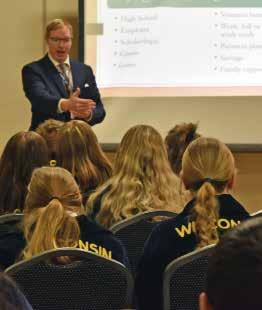
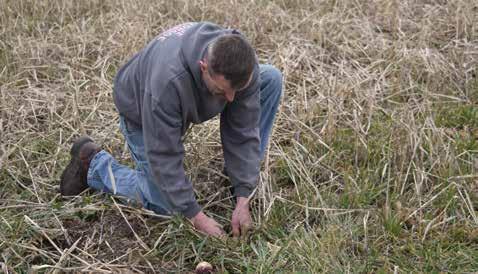
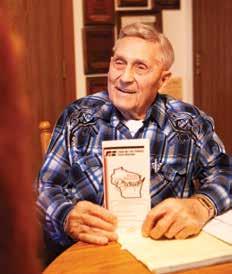
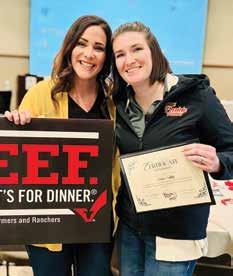


LEGISLATIVE ACHIEVEMENTS
Wisconsin agriculture celebrates a successful legislative session.
IGNITE CONFERENCE
Members gained leadership knowledge in Neenah and Eau Claire.
FFA FARM FORUM
More than 315 high school juniors and FFA advisors attended FFA Farm Forum.
WATER QUALITY
The UW-Madison Division of Extension is committed to on-farm water research.
FOCUSED ON SUSTAINABILITY
Farm Bureau members are the frontlines of conservation.
GROWING THE RURAL BOND
Greenfield reflects on his 50-year Farm Bureau membership recruitment legacy.
VOICES
Columns from Olson and Duvall.
TABLE TALK
Learn more about beef resources just in time for May Beef Month.
MENTAL HEALTH
Heroes of Hope nominations are open and learn more about Farm Rescue.
BOOK OF THE YEAR
Agriculture in the Classroom announces a new book.



3 wfbf.com APRIL | MAY 2024 contents vol. 30 no. 2
RURAL MUTUAL INSURANCE Insurance considerations for agritourism. 5 10 22 32 28 18 14 12 39 41 45 COVER STORY PHOTOS BY RACHEL LACOUNT stay connected WIFarmBureau ONLINE LIBRARY Read our previous issues at wfbf.com/read. SUPPLIED PHOTO RuralRoute 10 12 32 22 18
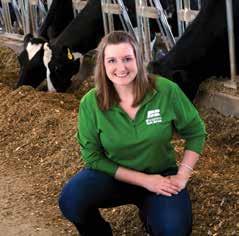
Of all the seasons, winter heading into spring is one of the hardest times for me to adjust to. I just feel like every day is something different. Between motherhood and working in communications, I get enough of that in a daily dose already and really don’t need more from Mother Nature too.
The one thing I do enjoy about spring is that it’s seed season. For gardeners like me, it’s time to rip open those much anticipated seed packets and get things germinating. For spouses married to those said gardeners, it’s that time of year where potting soil makes it in the house and plants start overtaking places you promised they wouldn’t. Maybe this is just our house, but I’d bet that it’s not.
For those who are interested in plants, I’m sure you spend plenty of time reading about the right climate for those seeds of yours and reread many times all the details about them. How deep do you plant them? How many weeks out from frost do they need to get established? What kind of fertilizer or support are they going to need?
During a late-night planting session, I
got to thinking about just how nice it would be if people came with their own little seed packet of information. Then we would know exactly what they needed to thrive. I think mine might say “gets cold easily but also hates heat and for best results spritz with coffee or espresso.”
Joking aside, just like seeds I think we all need certain surroundings to grow and reach our full potential. I think that’s what makes Farm Bureau so effective, especially with events and programming. Just about anyone can find something that will help them learn and grow to be a better leader.
We are coming off the usual event season. Lots of conferences and meetings have occurred in the past couple of months. You’ll also see that this issue has a theme of growth and sustainability.
The feature story on page 18 is focused on how our members are on the frontline of conservation. I promise these are just a few examples of how our members are leading this conversation.
Speaking of growing, Trayton Greenfield – a familiar name in our organization – talks about his efforts on membership and how he has grown the Farm Bureau family through the years.
I mentioned events season above. You’ll find lots of recaps of the conferences and events throughout the pages as well.
Whether you are working on growing plants, animals or yourself, I wish you the best in the coming weeks. Remember your Farm Bureau support system through the ups and downs that you are sure to experience during the process.
As always, thanks for reading.
Amy Eckelberg Rural Route Editor Wisconsin Farm Bureau Federation
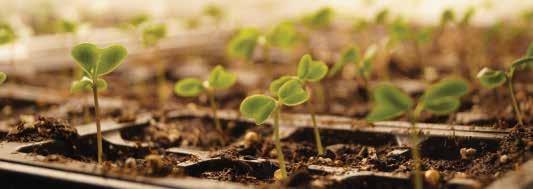
4 WISCONSIN FARM BUREAU FEDERATION Rural Route Editor Amy Eckelberg - 608.828.5706 Designer Lynn Siekmann - 608.828.5707 Contributors Cassie Sonnentag - 608.828.5711 Rachel LaCount - 608.828.5709 Kylie Ver Kuilen - 608.828.5721 Address of Publication Wisconsin Farm Bureau Federation PO Box 5550 1241 John Q. Hammons Dr. Madison, WI 53705-0550 Postmaster: Send address changes to Wisconsin Farm Bureau Federation PO Box 5550 Madison, WI 53705-0550 Contact Information 608.836.5575 800.261.FARM (3276) wfbf.com info@wfbf.com WFBF Board of Directors Brad Olson, Frederic (President) Joe Bragger, Independence (Vice President) Dave Daniels, Union Grove Arch Morton Jr., Janesville Robert Nigh, Viroqua Kevin Krentz, Berlin Dan Meyer, Kiel Brian Preder, Weyauwega Kim Bremmer, Loyal Brenda Dowiasch, Augusta (Promotion and Education Committee Chair) Kat Peper, Rock Springs (YFA Committee Chair) Wisconsin Farm Bureau Federation’s Rural Route (ISSN 1082-1368) (USPS 39940), the official publication of the Wisconsin Farm Bureau Federation, is published six times per year in February|March, April|May, June|July, August|September, October|November and December|January. Subscription of $5 is included in Farm Bureau dues. Periodical postage is paid at Madison, Wisconsin. All rights reserved. No portion of this magazine may be reproduced in whole or part without written consent. For advertising rates and information: Wisconsin accounts contact Slack Attack at 608.222.7630 or barbara@slackattack.com. National accounts contact Casey McNeal at 800.798.2691 ext. 334 or casey@iafalls.com. For general inquiries, contact Amy Eckelberg at 608.828.5706 or aeckelberg@wfbf.com. Rural WISCONSIN FARM BUREAU FEDERATION’S Route
EDITOR’S NOTE
Farm Bureau Celebrates Legislative Achievements
By Jason Mugnaini
Wisconsin Farm Bureau had a very successful legislative session in 2023-24. With newly drawn legislative maps and a growing number of retirements among veteran legislators, the next session will likely bring new opportunities and challenges, but it’s important to look back and see the progress made during the prior legislative session.
A significant portion of legislative work during any session typically revolves around appropriations in the state budget, and this session proved to be no different. WFBF led the charge to create the Agricultural Road Improvement Program (ARIP) to provide $150 million in grants to upgrade weight-posted roads that have plagued farmers with problems for decades.
In addition, WFBF and other stakeholders fought for funding increases for numerous other programs farmers rely on including:
• $2 million for meat processor grants.
• $500,000 per year for grants to dairy processors.
• $2 million for the Wisconsin Agricultural Export Promotion program.
• Farmer mental health funding of $100,000 per year.
• $2 million for nitrogen optimization pilot program grants.
• $70,000 per year for livestock premises registration.
• Additional $50,000 per year for Wisconsin Agriculture in the Classroom program.
• $1.6 million for cover crop rebates.
• Maintained funding for producer-led watershed protection grants.
• $22,176,500 in funding for county conservation departments.
• $125 million to address PFAS contamination.
• $1 million in 2024-25 for well compensation and well abandonment grants.
• $6.5 million for rural nonpoint source water pollution abatement grants.
• $200,000 per year for Targeted Runoff Management grants.
• $3 million reallocated to fund the Food and Farm Exploration Center in Plover.
In addition to these funding priorities, we found success in pursuing policy changes. The Farmland Preservation program got some much-needed updates to shorten the minimum enrollment period from 15 to 10 years and increase the financial incentives for farmers, bringing them in line with the rising costs of compliance. We also encouraged the passing of a bill to maintain a farm voice on county conservation committees after USDA concluded it was a conflict of interest to have FSA representatives sitting on these committees.
On the transportation front, bills passed to extend the allowable time period to use a farm Commercial Driver's License (CDL) from 180 to 210 days, expand the use of permits for 98,000 pound six-axle milk trucks to allow hauling other milk products and to create a CDL training grant program to

address the shortage of available drivers.
Two bills which also passed this session helped progress two major projects to increase agricultural processing capacity. The bills facilitated tax incremental financing to help Minnesotabased CHS build a $700 million soybean processing facility in the City of Evansville in Rock County and Belgian potato processor, Agristo, build a $40-50 million potato processing plant in Stevens Point. The Evansville facility is expected to process 70 million bushels of soybeans each year, increasing profits for farmers and creating 90 new jobs for the local economy. The Stevens Point plant is expected to create 150 jobs and purchase 10,000 to 20,000 acres of potatoes from Wisconsin farmers annually.
On the last days of floor action in the state legislature, legislation was passed pre-empting local governments from enacting local ordinances dictating operational animal agricultural practices and protocols. Concerns have been growing regarding regulations that destabilize agricultural production and impose arbitrary regulations or prohibitions, similar to that of California’s Prop 12, coming to Wisconsin in the form of disruptive local ordinances. This legislation would have preempted these types of local regulations providing regulatory certainty to Wisconsin farms, but was vetoed by Gov. Evers.
All these things have been possible through a strong presence in the state capitol, but more importantly because Farm Bureau members participate in their communities and build relationships with their elected officials at all levels of government. Our continued success in the future relies on ongoing grassroots advocacy and political engagement of our members.
5 wfbf.com APRIL | MAY 2024
ISSUES
ISSUES Congress Faces a Big Agricultural 2024 To-Do List
By Tyler Wenzlaff
In 2024, agriculture faces a myriad of challenges. With a farm bill overdue by a year, impending Federal Milk Marketing Order reform and regulatory ambiguity, farmers are grappling with increased unpredictability. Additionally, the upcoming November elections loom large, potentially ushering in state government shifts and significant changes in federal policy. It's undeniable that 2024 marks a pivotal juncture for the agricultural landscape in our nation.
Farm bill action remains agriculture’s top priority in 2024. Congress typically passes a farm bill every five years. Previous farm bills have faced legislative hurdles in the past as it’s not unusual for a farm bill to be delayed and receive extensions. On Nov. 16, 2023, President Biden signed an extension to the 2018 Farm Bill. H.R. 6363, the Further Continuing Appropriation and Other Extensions Act, extended the 2018 Farm Bill programs through Sept. 30, 2024. While this provides some certainty for farmers through the summer, the deadline lies right at the beginning of harvest season and only days before the November election.
Congressional inaction on a farm bill has undesirable effects across the industry. The timing and consequences of the farm bill expiring vary by program. There are two new principal expiration dates: Sept. 30, 2024, and Dec. 31, 2024. The major issues and consequences for expiration are the following:
• For programs with mandatory funding that is provided by the farm bill and for provisions that expire at the end of fiscal year 2024, they will not continue to operate without an extension or formal farm bill passage.
• For programs that are authorized by fiscal year and are funded at the discretion of Congress, or for programs with mandatory spending authorized but not appropriated by the farm bill—such as the Supplemental Nutrition Assistance Program (SNAP)—an appropriations act or continuing resolution would allow for the programs to continue.
• For the farm commodity and dairy support programs that expire after the 2024 crop year, the consequences of expiration begin on Jan. 1, 2025, when inactive and outdated laws—commonly called permanent law—would be restored for dairy, the first commodity affected in the new crop year. Under permanent law, USDA would be required to support eligible commodities at levels that exceed 2024 market prices. USDA has found during previous farm bill reauthorizations that billions of dollars of additional government expenditures could occur if the permanent law were to be enforced.
• Conservation programs are not in the same danger. The IRA, commonly known as the Inflation Reduction Act of 2022, extended some—but not all—conservation programs through fiscal year 2031.
• Some programs, such as crop insurance, are permanently authorized, do not expire, and would not be affected by farm bill expiration.
Expecting Congress to pass a farm bill days before a pivotal

election seems unlikely. This leaves the most probable scenario as another extension leaving a future Congress and possibly a new president with the ability to shape agriculture policy for the next five years.
If inaction on a farm bill wasn’t destabilizing enough, USDA continues its work to reform the Federal Milk Marketing Orders. A process that started in August of 2023, the FMMO public hearing portion of the process has concluded and now USDA is working on transcribing the hearing record. Within the next couple of weeks the hearing record should be available and interested parties will have the opportunity to file corrections to the transcript.
There are still many steps in the federal order hearing process before any referendum approved can be implemented. Remaining steps once the public hearing concludes include:
• Participants file post-hearing briefs.
• USDA issues a recommended decision in the Federal Register.
• Parties file comments and exceptions to the recommended decision.
• USDA issues a final decision.
• USDA holds a referendum and implements the amendments.
Combined, the remaining steps include up to 270 days between when the hearing transcript is published and when a referendum may occur. This puts any likelihood of pricing regulatory changes into 2025 or later. It is important to reiterate if farmers reject the final rule, USDA has a precedent of terminating the order completely. This means instead of returning to the order regulations that were in place before the hearing, the order and its regulations cease to exist altogether.
The previous revisions to the uniform FMMO pricing formulas were made in the early 2000s, and proponents contend they should be amended now to reflect the significant changes that have occurred in the dairy industry and milk marketing in the last two decades.
Since May 2019, the price for Class I milk, milk used to produce beverage milk products, has been calculated using
6 WISCONSIN FARM BUREAU FEDERATION Rural Route
the simple average of advanced Class III (cheese) and Class IV (milk powders) skim milk prices plus 74 cents. In years prior, the formula was the “higher-of” advanced Class III and Class IV skim milk prices. Milk marketing conditions, starting with COVID-19 induced disruptions, have since resulted in continued revenue pool losses as a result of the formula switch. In November 2023, cumulative pool losses since the formula change passed $1 billion.
At the end of January, American Farm Bureau Federation sent a letter requesting USDA to issue a final decision on an emergency basis to speed the implementation of the “higher of” Class I mover formula. Wisconsin Farm Bureau was joined by California and Texas Farm Bureau’s in echoing AFBF’s call for an emergency change to be made. As the top three
dairy producing states in the country and representing more than 500,000 members, our letter asking for emergency action from USDA is the most significant call to action by dairy farmers in years.
The close of another Congressional legislative session and an election year means a race to the finish line for legislators to woo rural voters. Farm bill and FMMO reform remain the biggest priorities. Potential H-2A visa reform, legislation addressing Prop 12, limits on foreign landownership and agriculture's trade imbalance remain top issues still to be affected by Congress.
We shouldn’t expect Congress to make up for lost time, farmers must remain engaged. 2024 has the possibility to change the agricultural landscape across the country and farmers must have the ear of their representative.
What You Need to Know About ARIP
The application period for the first round of grants closed on April 5, but the second round, allotting $100 million to fix farm roads, will open soon. Here’s what you need to know to have the best chance of upgrading the roads you use.
WHAT IS ARIP?
Agricultural Road Improvement Program or ARIP is a new state grant program specifically designed to fix rural roads that are posted for weight and cause issues for farmers. The program provides $150 million in grants to local governments that will cover 90% of the cost to upgrade town, municipal or county roads that have been posted for weight and are used by farmers to do business.
WHAT ROADS ARE ELIGIBLE FOR GRANTS?
To be eligible for a grant under the program a route or structure must:
• Have been posted for weight for at least one month in 2023.
• Be a local road maintained by your township, village, city or county.
• Provide access to agricultural lands or facilities. It might be the road at the end of your driveway or the road you need to use to get to your field, get products to processors or get things like feed from a facility to your farm.
WHAT MAKES A STRONG APPLICATION?
The point of the programs is to fix and upgrade farm roads that are posted for weight because they are old or worn out. Grant applications will be judged based on how much they help farmers get things where they need to go. Applications will be judged based on:
• Providing the greatest positive economic benefit to farms.
• Providing access to the largest number of farmers or volume of agricultural goods.
• Reducing the cost for farmers from repeated trips at reduced weight or having to drive around a posted road. (Making

extra trips or driving further adding costs for labor, fuel or mileage/wear on agricultural equipment.)
• If the road is the only feasible way to access a farm field or facility.
LOCAL OFFICIALS NEED INFORMATION FROM FARMERS TO COMPLETE A STRONG APPLICATION.
They have no other way to know how the road posting impacts your farm. To help you give them this information in the most helpful way possible we have created the ARIP Farmer Support form. Farmers need to fill out this simple twopage form available at wfbf.com because your local official will need to answer the questions on the form when they fill out the Department of Transportation application for the program.
At the bottom of the form is a small space asking farmers to describe how the project would impact their business. This will be very helpful to both local officials filling out the applications and to the committee reviewing the applications in understanding the potential impact of the project.
If you have questions on the form or need help working with your local officials WFBF can help. Reach out to WFBF Senior Director of Governmental Relations Tim Fiocchi if you have any questions or if you would like help talking with your local officials. You can reach Tim at tfiocchi@wfbf.com or 608.828.5712.
7 wfbf.com APRIL | MAY 2024
Zimdars Hired as WFBF’s Governmental Relations Administrative Assistant

Nate Zimdars has been hired as the Governmental Relations Administrative Assistant by Wisconsin Farm Bureau Federation.
Zimdars will be responsible for providing daily support and assistance to WFBF’s Governmental Relations team, coordinating meetings and events and monitoring legislative progress on the local, state and national levels.
Zimdars’ involvement with agriculture has included service as a state FFA officer and president of the Wisconsin FFA Alumni. He has been a Farm Bureau member for more than a decade, having served on the Fond du Lac County Farm Bureau

board of directors, graduated from the Wisconsin Farm Bureau Leadership Institute, was the 2014 winner of the Collegiate Discussion Meet and the Young Farmer and Agriculturist Discussion Meet winner in 2023.
“Nate is no stranger to Farm Bureau, making him the perfect fit for our governmental relations team,” said WFBF Executive Director of Governmental Relations Jason Mugnaini. “I look forward to leveraging Nate’s background in agriculture and political experience as he acclimates to his new role.”
Zimdars grew up on a small hobby farm outside of Ripon, raising sheep and poultry. He attended UW-Fond du Lac and UW-Madison majoring in political science and history. Prior to joining the WFBF staff, he was a Farm Broadcaster with the Mid-West Farm Report before most recently working as a machine operator for Emmi Roth Cheese in Stoughton. Zimdars lives in Madison.
Zimdars began his duties on Feb. 5.
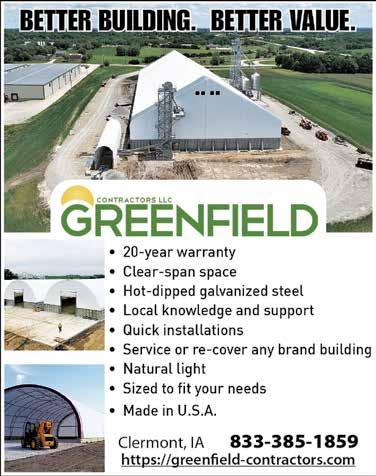
8 WISCONSIN FARM BUREAU FEDERATION Rural Route NEWS

In February, Wisconsin Farm Bureau members traveled to attend the 2024 World Ag Expo in California. The trip provided the opportunity to meet local farmers, tour processors and sightsee in the Golden State of California. Members spent two nights in San Francisco, three nights in Lenmoore and two nights in Los Angeles. To read a recap and see photos, visit bit.ly/2024WorldAgExpo.
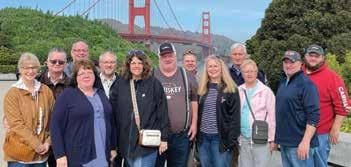


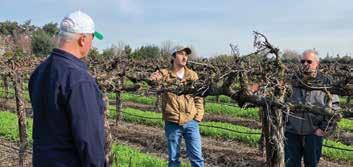
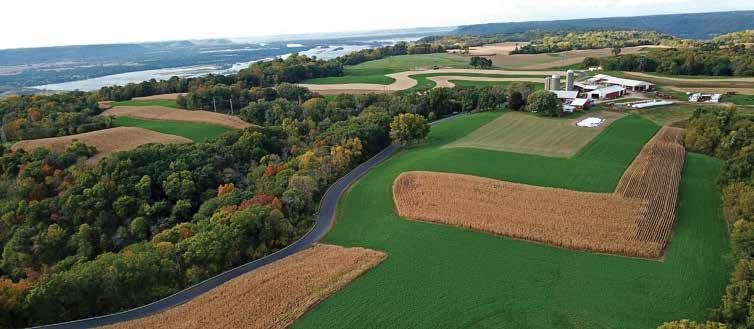
Nominations and applications are now being accepted for the 2024 Wisconsin Leopold Conservation Award®. The $10,000 award honors farmers and forestland owners who go above and beyond in their management of soil health, water quality and wildlife habitat on working land.
Application Deadline: August 1, 2024
To view the application form, visit www.sandcountyfoundation.org/ApplyLCA
T
Conservation Pays in Wisconsin

=Presented by:


9 wfbf.com APRIL | MAY 2024

The IGNITE Conference serves as a statewide gathering for county Farm Bureau leaders, offering information, training, and member engagement activities. Conducted by WFBF staff with support from external speakers, this biennial event aims to empower county Farm Bureaus and their leaders by furnishing them with program ideas, resources, and tools to strengthen their county Farm Bureau.
This year, the program featured two one-day events - one held on Friday, March 1 in Eau Claire, and another on Saturday, March 2 in Neenah.



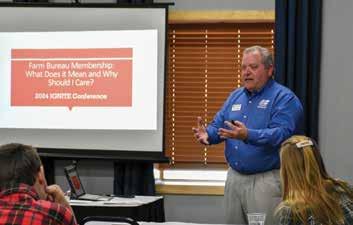
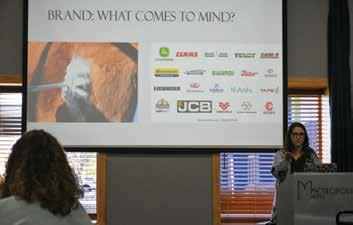
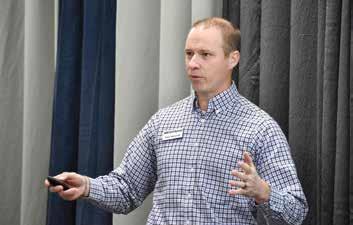
10 WISCONSIN FARM BUREAU FEDERATION Rural Route
1 3 5 2 4 6




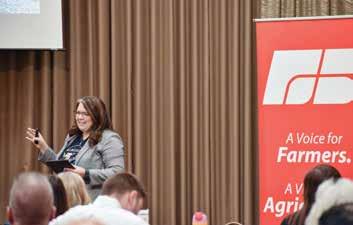
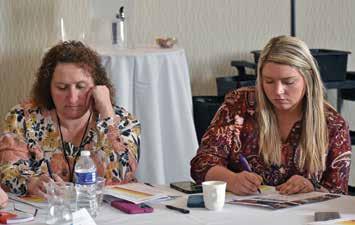
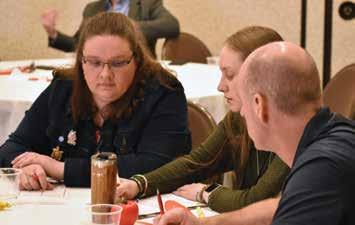
1. WFBF District 9 Coordinator Katie Mattison presented 'I Move That! Making the Most of Your Meetings.'
2. WFBF Executive Director of Member Relations Bob Leege presented 'Farm Bureau Membership - What Does it Mean and Why Should I Care.'
3. Members discussed ways to construct a resilient county Farm Bureau board.
4. Hannah Barthels, writer and content strategist, taught members about branding their events.
5. Wisconsin Agriculture in the Classroom Coordinator Beth Schaefer presented 'How to Ag in the Classroom Without a Title.'
6. WFBF Director of National Affairs Tyler Wenzlaff presented 'WFBF Policy Development: A Grassroots Process.'
7. WFBF Executive Director of Governmental Relations Jason Mugnaini presented 'Strategic Advocacy: Harnessing the Power of Your Governmental Relations Team.'
8. The opening keynote speaker was Jenny Holterman - California almond grower, advocate and creator.
9. Members shared ideas and discussed strategies to bring back to their county Farm Bureaus.
10. Members completed a worksheet on how to create a crisis communication plan.
11. Attendees networked during the Neenah portion of the IGNITE Conference.
12. Members considered areas of improvement and brainstorm strategies for enhancing their strengths.
11 wfbf.com APRIL | MAY 2024
7 9 11 8 10 12
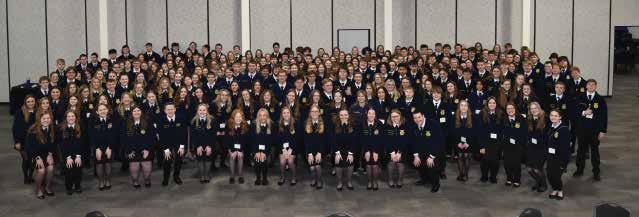
More Than 315 Attend Farm Bureau's
FFA FARM FORUM
More than 315 high school juniors and FFA advisors
from across
the
state
attended Wisconsin Farm Bureau’s FFA Farm Forum in Rothschild on Feb. 15.
“F
FA Farm Forum is an opportunity for the next generation in agriculture to gain new experiences and leadership skills,” said Wisconsin Farm Bureau Federation President Brad Olson. “We appreciate FFA members participating in FFA Farm Forum, investing in both themselves and the future of agriculture.”
The keynote speaker was Katrina Hoesley. Hoesley encouraged students to live out their best values with intention and to connect their passions with a driving purpose to ensure success.
During the one-day event, FFA members attended careerbased workshops including: ‘Explore the World of Marketing and Communications’ with Kendall Riskedal of Broadhead. and Country Lights Soy Candles; ‘Navigating Ag Horizons: My Journey from FFA to Farm Bureau’ with Ben Sand of 715 Risk Advisors LLC; ‘Redefining and Celebrating Sustainability’ with Rachel LaCount of WFBF; ‘Ag Lending: More Than Just Loaning Money’ with Josh Schmidt of AgCountry Farm Credit Services; ‘FFA, YFA and Your Ag Experience’ with Katrina Hoesley; and ‘Your Passion + The Right Training = Career Success’ with Adam Wehling of Chippewa Valley Technical College.
“FFA Farm Forum is a great partnership between Wisconsin Farm Bureau and Wisconsin FFA to encourage leadership development and exploration of careers in agriculture,” said WFBF Director of Young Leader Programs Melissa Jacobson.
“We were excited to provide this opportunity for future agricultural leaders.”
The Wisconsin Farm Bureau Foundation sponsors FFA Farm Forum in cooperation with the Wisconsin Association of FFA. The Wisconsin Farm Bureau Foundation was established in 1988 to provide support for agricultural education and leadership programs. Through donations and other contributions, the Wisconsin Farm Bureau Foundation invests time and resources to support the next generation of agriculturists.
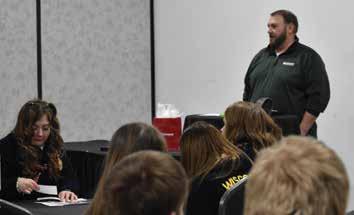
12 WISCONSIN FARM BUREAU FEDERATION Rural Route
Josh Schmidt spoke to students about the different careers that help provide financial solutions to farmers, businesses and rural communities.
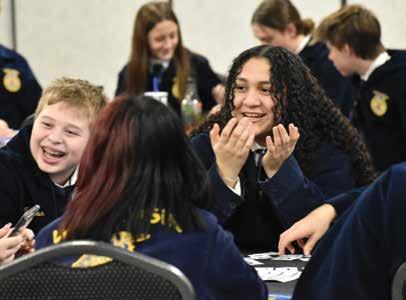
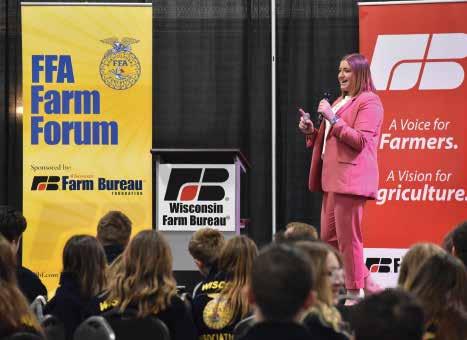
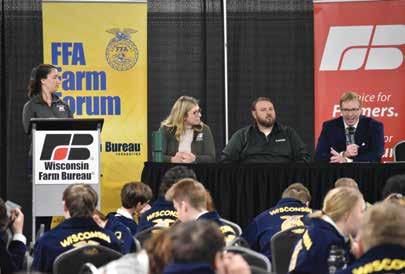
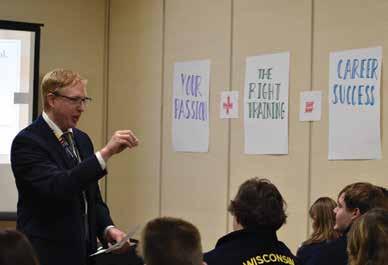

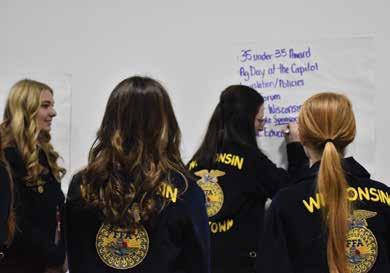
Captions
1. Students made connections with others from around the state over their shared interest in agriculture.
2. Rachel LaCount, Josh Schmidt, Adam Wehling and Kendall Riskedal participated in a Q&A panel session focused on career preparation.
3. Katrina Hoesley served as the keynote speaker, encouraging students to unlock their full potential and live with intention.
4. Adam Wehling of Chippewa Valley Technical College presented his workshop titled ‘Your Passion + The Right Training = Career Success.’ The workshop explored the various trades and agriculture training options found in Wisconsin.
5. Katrina Hoesley's workshop helped students discover how FFA and YFA serve as stepping stones toward fulfilling their agricultural goals.
6. Students identified opportunities to get involved as they transition from FFA to Farm Bureau.
13 wfbf.com APRIL | MAY 2024
1 2 3 4 5 6

Water Quality Work Begins with OnFarm Research and Information Sharing Water Quality Work Begins with OnFarm Research and Information Sharing
The UW-Madison Division of Extension is committed to conducting on-farm research and delivering solutions that address the water quality concerns of Wisconsin farmers and communities. Extension’s Agriculture Water Quality Program and Discovery Farms Programs work in tandem to conduct credible research tailored to farmers' needs. We deliver user-friendly research results and recommendations, offering customized solutions for various landscapes and management systems.
DISCOVERY FARMS:
The Discovery Farms Program has placed a strong emphasis on farmer leadership and on-farm research since it’s establishment in 2001. Our program is armed with 200 siteyears of edge-of-field monitoring data on surface runoff. We recently added new monitoring techniques to include belowsurface assessments, providing insights into water and nutrient leaching to groundwater.
Housed within Extension's Agriculture Water Quality Program, Discovery Farms collaborates with farmer leaders to identify research priorities. Meanwhile, the Agriculture Water Quality Program focuses on outreach, sharing research findings to Wisconsin's agricultural community.
AG WATER QUALITY PROGRAM:
The Ag Water Quality Program is staffed by Regional Extension Water Quality Outreach Specialists who address regional needs by sharing relevant information with their respective communities. Our team disseminates research findings from Discovery Farms and UW-Madison to stakeholders.
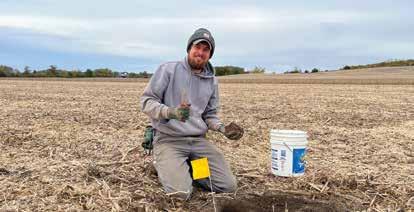
IMPORTANT FINDINGS FROM ON-FARM RESEARCH:
See our latest research findings and follow the QR codes for deeper learning.
Soil conservation practices reduce soil loss during critical times
• May, June and July are critical for soil loss
• Twenty years of Discovery Farms research has shown that a majority of soil loss occurs during May and June in Wisconsin. When soil is lost, Phosphorus (P) is also lost in the particulate form.
• Cover crops and reduced tillage can be applied as soil conservation practices. This helps to keep soil in place by promoting soil aggregation and providing residue that protects soil from wind and water during this vulnerable period. Adoption of soil conservation practices has started to address the particulate P loss in the critical months of May, June and July across Wisconsin.

Upland and treatment practices protect water quality
• There are two types of protection practices in a conservation system: upland practices which keep the movement of soil and nutrients within a field to a minimum, and treatment practices that address movement off the field. In a conservation system, upland practices (like reduced tillage and cover crops) must be utilized in combination with treatment practices (grassed waterways or buffer strips) for beneficial water quality outcomes.
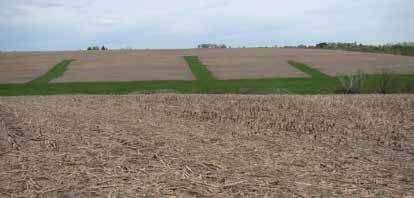 Information and imagery submitted by UW Madison Division of Extension Ag Water Quality Program and Discovery Farms
Scan for more on soil loss and cover crops.
Information and imagery submitted by UW Madison Division of Extension Ag Water Quality Program and Discovery Farms
Scan for more on soil loss and cover crops.
• Grassed waterways must be designed and maintained in areas of concentrated flow within a field. Without erosion control from well-maintained grassed waterways, gullies will form and diminish the benefits of practices like cover crops or no-till. Upland and treatment practices must work as a system to achieve intended benefits.
Grassed waterways and soil loss
• Grassed waterways stabilize areas of concentrated water flow. If grassed waterways are installed properly and have an adequate grass cover, they can significantly reduce sediment and nutrient losses. The roots of the growing grass help to keep sediment and nutrients in place while the grass helps to catch soil particles carried in runoff as it concentrates and leaves the field. Waterways also help to minimize the impact of large precipitation events by slowing down and infiltrating runoff. When soil remains in place, sediment and nutrients are not transported to nearby streams, rivers and lakes. This helps to keep water cleaner and aquatic ecosystems healthier.
A CASE FOR GRASSED WATERWAYS
• An ongoing edge-of-field monitoring study on a farm in Kewaunee County started in 2019 and has since illustrated the impact and importance of stable grassed waterways. This was not the intended topic of the study, but with the runoff results it became obvious that there was something larger occurring. Runoff is collected year-round at a monitoring station to determine the amount of water, soil and nutrients leaving the field watershed. Samples are taken and analyzed for soil, phosphorus and nitrogen contained in the runoff. In this particular study, the field has grown corn silage the past four years and utilizes reduced tillage and cover crops. In 2019 and 2020, exceptionally large amounts of runoff, soil and nutrients were found to be leaving the field. While investigating the reason for such high runoff amounts, it was visually noted that rill and gully erosion were occurring on the site. Even though this site utilized cover crops and

Discovery Farms surface runoff monitoring equipment is installed in an area where water concentrates and leaves the field. Farmers partner with Discovery Farms to understand more about the impact of their farming system on local streams, rivers and lakes. Discovery Farms has surface runoff stations installed in Langlade, Kewaunee and Marathon counties.
reduced tillage, a concentrated flow was forming that ran directly into the collection monitoring station. To reduce the erosion in the area of concentrated flow, a grassed waterway was installed in late summer of 2020.
• The data shows that the newly-installed waterway aided in significantly reducing soil leaving the field (99% reduction). Even a seemingly small set of rills or a developing small gully can transport thousands of pounds of soil off the field. This field has cover crops and no-tillage in its management, yet large amounts of sediment loss were still occurring. This displays the necessity of utilizing treatment practices in the system.

EFFECTIVELY MANAGE NITROGEN ON YOUR FARM
Calculate your potentially leachable nitrogen by doing your own nitrogen trial
• Nitrogen Use Efficiency evaluates N management for economic and environmental impacts, establishing benchmarks applicable to corn production in Wisconsin. Simple assessments like partial factor productivity (PFP) and N balance help identify areas for improvement in both profitability and water quality, particularly in fields with lower efficiencies.

Discovery Farms has installed networks of pan lysimeters (pictured here) on farms in Pepin, Calumet and Rock County to test the effectiveness of best management practices to reduce nitrate leaching. The monitoring equipment is placed in a soil profile four feet below the surface to monitor water movement and nitrogen leaching through an agricultural field.
• You can set up your own research trial by incorporating in-field test strips, including zero-N and reduced N rate strips, which offer valuable insights into nitrogen cycling dynamics and potential reductions in fertilizer inputs, aiding in optimizing N management practices amidst rising costs and environmental concerns.
• Understanding on-farm nutrient budgeting helps identify management interventions to prevent unnecessary additions
15 wfbf.com APRIL | MAY 2024
Scan for more on grassed waterways and erosion.
or excessive losses. Achieving a balance between crop needs and environmental losses is crucial for productivity and sustainability in on-farm nutrient planning.

Scan for more on nitorgen budgeting.

Scan for more on nitrogen use efficiency.
Commercial Nitrogen Optimization Pilot Program (NOPP)
This Department of Agriculture, Trade and Consumer Protection and UW-Madison grant program provides funding to agricultural producers to conduct 2-year on-farm research projects, in collaboration with Universities of Wisconsin System scientists, that enhance understanding of and refine new methods that optimize nitrogen applied to agricultural fields.
HIGHLIGHTS FROM THE YEAR

Ignite Conference Session Sparks Water Quality Conversations
Ag Water Quality Outreach Specialists Laura Paletta and Guolong Liang led a breakout session titled “Let it Flow: Thinking through agricultural sustainability and water quality” at Farm Bureau’s Ignite Conference that took place on March 2. Participants in the session shared their farm sustainability journeys and identified common interests including farm success for future generations and preserving water quality.
Laura and Guolong facilitated an in-depth discussion with participants focused on communicating about agriculture and water quality with individuals from a non-agricultural audience. There is a need for an emphasis on educating both other
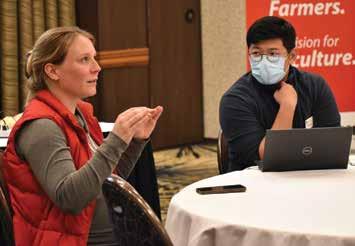
farmers and the wider community about best management practices (BMPs) and the science behind water quality issues to foster understanding and collaboration.
Wisconsin Water Quality and Soil Health Conference
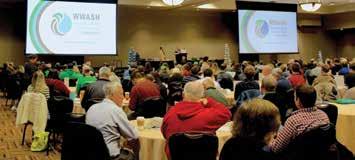
The inaugural Wisconsin Water Quality and Soils Health (WWASH) Conference took place Dec. 7-8, 2023. The WWASH conference was built upon the legacies of two pivotal events, the Wisconsin Cover Crop Conference and the Discovery Farms Conference. The combination of these conferences allowed for a wider range of featured topics and talks under one roof. More than 400 attendees experienced thought-provoking discussions and walked away with a better understanding of the intersections of agronomy, water quality, and soil health.
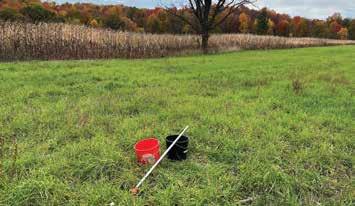
Soil sampling is an effective way to understand more about your crop needs, soil nutrient content and more. The Ag Water Quality Program has been busy soil sampling this fall to better understand phosphorus content at the soil surface in different farming systems. A high concentration of phosphorus at the surface can increase risk of loss to water resources.
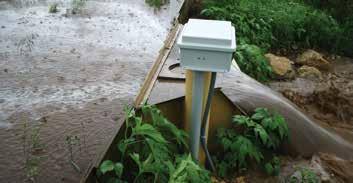
Water flows through Discovery Farms water quality monitoring equipment. As rainfall events continue to get larger, Discovery Farms is using data collected on Wisconsin farms to suggest ways to increase infiltration and protect soil from erosion in events like this.
16 WISCONSIN FARM BUREAU FEDERATION Rural Route

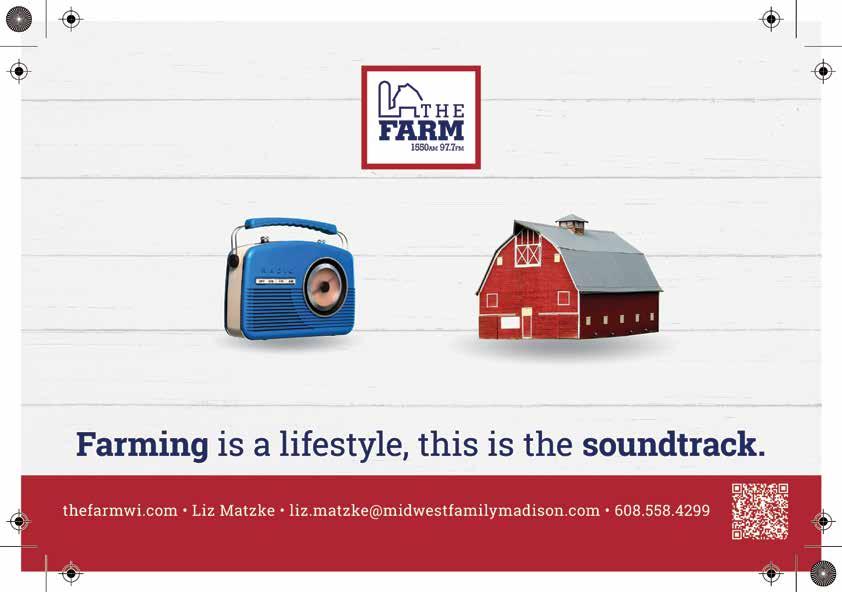
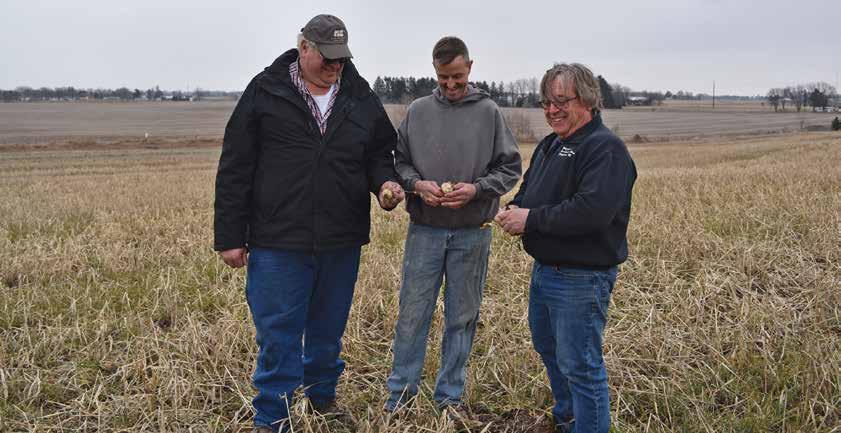
CONNECT, COLLABORATE, CELEBRATE
Wisconsin Farm Bureau Members on the Frontlines of Conservation
By Rachel LaCount
There’s no doubt that Wisconsin Farm Bureau members make things happen. Whether serving on committees, executing an event or advocating for policy, in the hands of a WFBF member, things will get done.
When it comes to advancing conservation initiatives and conversations, Farm Bureau members are connecting with their community, collaborating with partners and celebrating success.
CONNECT
Travis Klinkner from Vernon County wanted to start a watershed group in his area. He thought it would be beneficial to get a group of farmers together to tap into the resources available to farmers through the Department of Agriculture,
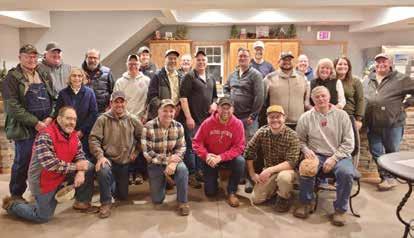

Trade and Consumer Protection Watershed Protection Grant program. He took his idea to his county Farm Bureau board meeting.
Robert Nigh and Dave Mc Clurg, fellow Vernon County Farm Bureau board members, agreed that it would be a positive thing to have a watershed group in the county. The grant criteria calls for at least five farmers to be involved in a watershed to qualify for its funding. They needed a few more farmers on board to get the group going. The trio decided at a monthly Farm Bureau board meeting to invite more farmers in the community to see who else was interested. With two weeks until the grant application deadline, 10 people expressed interest and the Bad Axe watershed group was formed.
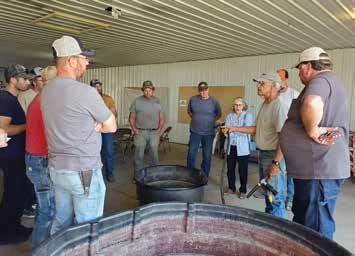
18 WISCONSIN FARM BUREAU FEDERATION Rural Route
The Bad Axe Watershed Group has grown to 45 members since it began in 2020.
The Bad Axe Watershed Group is truly farmer-led. It is a space for farmers to learn from each other and try new things.
TRAVIS KLINKNER TRAVIS KLINKNER
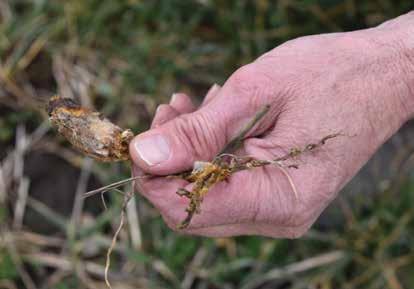
The group’s first official meeting was at Kevin Parr’s farm, winner of the 2020 Vernon County Conservation Farmer of the Year award. Fifteen people attended the first meeting.
“I was sitting here alone thinking I was the only one who cared about conservation in my community. Come to find out, I have a lot of neighbors who appreciate conservation just as much as I do.”
- Travis Klinkner
The key to the group’s success is the shared passion among the 45 active members. Klinkner shared that everyone in the group is driven to do more and try new things.
“We have all tried something new because of this network,” said Klinkner.
The Bad Axe watershed group is part of a coalition with three other Vernon County watersheds, Coon Creek, Tainter Creek and Rush Creek. The coalition allows all four groups to work together collectively and share resources.
The focus of the Bad Axe watershed group is truly farmer-led. The group strives to be a resource in the community and invites their friends and neighbors to on-farm events that showcase what farmers are doing to protect their shared resources.
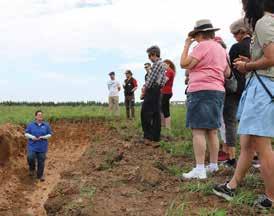

COLLABORATE
Every August, Green Lake County Farm Bureau and the Green Lake Association co-host a Conservation Field Day to showcase the efforts farmers are taking to protect Green Lake.
The Green Lake Association is a nonprofit group that promotes the conservation of Green Lake and its watershed with a focus on water quality. The group has 1,000 members interested in protecting the lake.
The first field day was in 2017 at Dave Wilke’s farm. The lake association wanted to partner with real farmers to witness first-hand what was happening in the fields and farmyards. The goal was to get farmers together to talk about soil health and conservation practices. That first field day was open to the public for everyone to see and learn.
Forty people attended the first field day. It has since grown to more than 200 attendees.
Most of the attendees are people who live on the lake or are interested in recreation on or around the lake. They want to know what farmers are doing to keep it clean.
“The ‘Lake Lovers’ are hungry for more information about what farmers are doing to preserve this beautiful lake,” said Green Lake County Farm Bureau president Pete Badtke.
The annual event is held at a farm within the watershed. The event rotates farms as much as possible to showcase a variety of tools and practices. A farm tour during the field day highlights

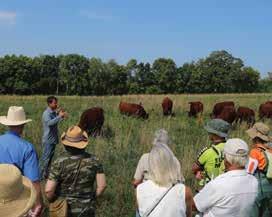
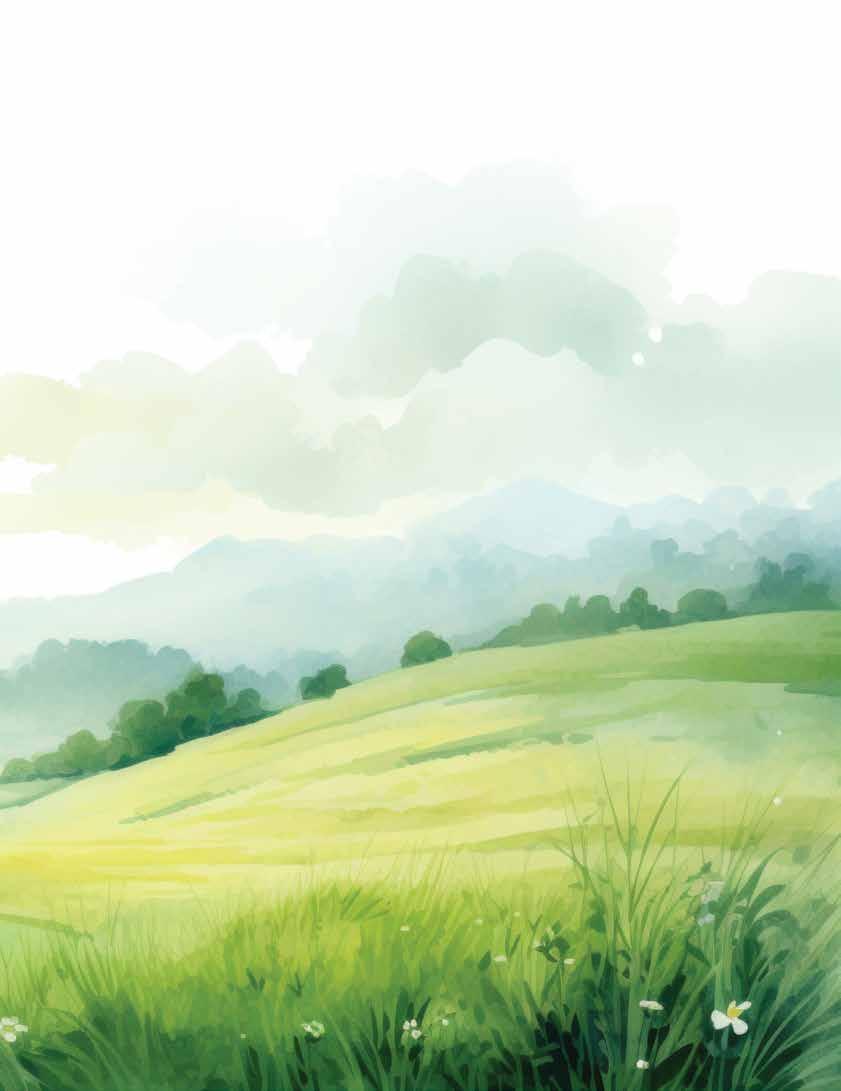
19 wfbf.com APRIL | MAY 2024
Green Lake Farm Bureau member Dave Wilke drove a tour wagon during the 2023 field day.
NRCS State Soil Health Coordinator
Jamie Patton showcased the impact of conservation practices with a soil pit demonstration.
Mat Boerson, Green Lake Association board member and host farmer, discussed the ecological benefits of rotational grazing.
GREEN LAKE ASSOCIATION
GREEN LAKE ASSOCIATION
GREEN LAKE ASSOCIATION

the conservation practices on the farm. The committee invites guest speakers from UW-Extension, USDA-NRCS and Soil and Water to discuss on-farm sustainability practices. Topics of discussion at the field days include cover crops, rotational grazing, creek and stream restoration and equipment demonstrations. The event also features face painting, corn hole and a petting zoo for kids.
Farm Bureau members volunteer to help make the event successful. Green Lake County Farm Bureau donates funds to the event every year to help offset the costs.
Three Green Lake County Farm Bureau members serve on the Conservation Field Day planning committee – Pete Badtke, Dave Wilke and Jim Hebbe. Jim Hebbe also serves on the Green Lake Association board of directors.
There is a healthy crossover between Farm Bureau membership and Lake Association membership in Green Lake County.
“As farmers and Farm Bureau, we have developed a nice working relationship with the Green Lake Association and its members by showing them we want to be good stewards of the land and that we care about the lake as much as they do,” said Badtke.
CELEBRATE
Each year, the Buffalo County Farm Bureau nominates a farmer for the prestigious Wisconsin Leopold Conservation Award.
Given in honor of renowned conservationist Aldo Leopold, the award recognizes landowners who inspire others with their dedication to land, water and wildlife habitat on private and working land. The award is presented by the Sand County Foundation in partnership with the American Farmland Trust. Winners receive $10,000.
“Our farmers model the Leopold land ethic because you have to use conservation practices to be successful here,” said Buffalo County Farm Bureau president Ed Rippley. “We feel farmers should be recognized for how they farm in the driftless area.”
Buffalo County Farm Bureau works together to decide who to nominate for the Leopold Conservation Award. Board members bring their suggestions to a county meeting. They want to recognize Farm Bureau members but can also use the opportunity to recruit new members.
In 2023, the county nominated Noll’s Dairy Farm. Mark, Curtis and Scott Noll farm 400 acres of cropland and manage 450 acres of forest, oak savannas and prairies overlooking the Mississippi River. They also milk 120 dairy cows.
Once the county selects a farm to nominate, they work with a
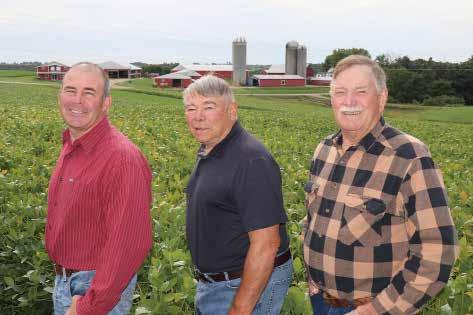
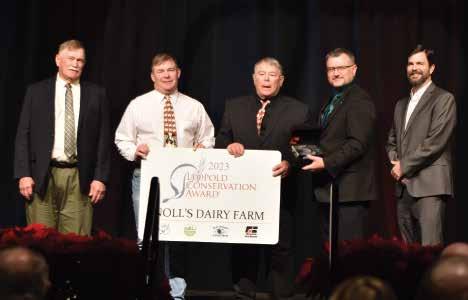
third party to write the application. Sometimes it takes a trusted individual to sit down with the farmer and have a conversation about what is happening on the farm to identify the projects and programs that are noteworthy to include in the application. For Buffalo County Farm Bureau and the Noll family, that individual was Carl Duley.
Duley was a UW-Extension agent in Buffalo County for 38 years. He had been called ‘a model extension agent,’ putting UW-Extension and the Wisconsin Idea to work at the farm level. He was well connected and trusted in the community. Duley learned that the Noll’s were awarded the Leopold Conservation Award before his passing in October.
The Nolls were recognized as the winners of the 2023 Wisconsin Leopold Conservation Award at WFBF’s Annual Meeting in December. Farm Bureau is a proud sponsor of the award.
Having a community of support to bring an idea to life is a benefit of being a Farm Bureau member. These members have proved that when you leverage the Farm Bureau network you can have a positive impact in your community. These three stories are just a few examples of the many ways Farm Bureau members are investing in sustainability.
Have you considered how you can engage in the conservation conversation in your community?
20 WISCONSIN FARM BUREAU FEDERATION Rural Route
Mark, Curtis and Scott Noll on their family farm.
The Noll family was presented with their award at the WFBF Annual Meeting in December 2023.
SAND COUNTY FOUNDATION


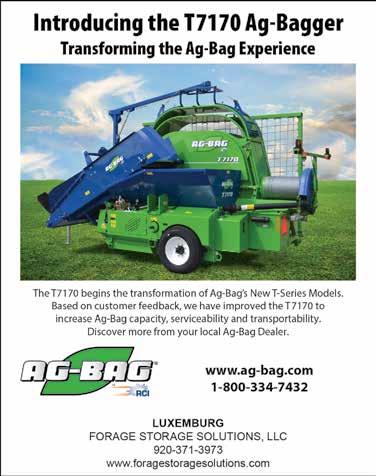

21 wfbf.com APRIL | MAY 2024

Of the 102 years that Fond du Lac County Farm Bureau has been in existence, a familiar face has graced the board for over half that time. The term “Farm Bureau Proud” is synonymous with Trayton Greenfield, the county membership chair who has recruited 2,404 members to the organization during the span of 50 years.
After spending a half century in the role, the 89-year-old volunteer officially retired as the Fond du Lac membership chair at the end of 2023. Reflecting on his time in Farm Bureau, his motivation is quite simple.
“I just love working with the people,” Trayton said.
BUSY AND MOTIVATED
Trayton’s Farm Bureau story began on his dairy farm in Waupun, where he milked cows and grew crops with a passion any farmer can relate to.
“There was nothing I loved more than my animals and the land,” Trayton said. “I joined Farm Bureau and was a member for four years before I was approached to join the board of directors.”
Fond du Lac County Farm Bureau was in need of a new membership chair. Trayton recalled the day WFBF field staff member Conrad “Connie” Naparella stopped at his farm.
“Like any farmer, I was always busy, but Connie said, ‘The busiest person always gets the job done’,” Trayton said. “And I had a picnic doing it.”
Trayton soon found immense joy in recruiting new members. In his second year as chair, he recruited more than 100 members – a level he reached several times through the years. He has kept track of every member he recruited by writing down their names on a legal pad.
GROWING THE RURAL BOND
Greenfield reflects on his 50-year Farm Bureau membership recruitment legacy
By Cassie Sonnentag
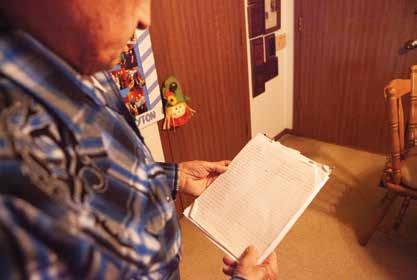
TRAYTON’S TOP FOUR TRICKS
Over his years of membership work, Trayton established several best practices for recruiting new members.
1. A smile goes a long way. Trayton said arriving and leaving with a smile on his face is the most important part of membership work.
“Even if they told me no, I would always leave with a smile and a commitment to stop by again another time,” Trayton said.
2. Cater to their interests. To show the variety of benefits and programs Farm Bureau has to offer, Trayton always had a variety of Farm Bureau tools and publications on hand. He particularly liked showcasing copies of Rural Route magazine and the local Farm Bureau newsletter.
“The state Farm Bureau has really great literature,” said Trayton. “I always ask them what their interests are and point

22 WISCONSIN FARM BUREAU FEDERATION Rural Route
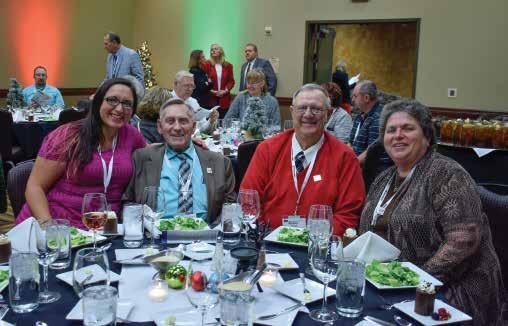
out things I think they would enjoy the most.”
3. Use your resources. Finding more than 2,400 members is no easy feat, but Trayton has found several resources beneficial in surfacing potential new members.
“I keep accurate records of those I have signed and review them to see if they have other family members or connections I could reach out to,” said Trayton. “I also kept an up-to-date platbook and would follow up on recommendations from other members.”
4. Making the ask. Trayton recommends meeting with potential new members in person, whenever possible. However, making the ask to join is the most important piece in recruiting new members, regardless of how you reach them.
“Speaking with someone eye-to-eye goes a long way,” said Trayton.
FARM BUREAU PROUD
Those who have attended the WFBF Annual Meeting likely recall Trayton’s recognition as the top volunteer in the Farm Bureau Proud Club year after year. Among the plaques adorning the walls of his home recognizing his membership accomplishments, there is one that holds an extra special place in his heart.
Upon hearing of Trayton’s retirement in 2023, American Farm Bureau President Zippy Duvall awarded Trayton a certificate of appreciation for his many years of membership work.
Zippy shared that Trayton is believed to be the longest serving membership volunteer in American Farm Bureau.
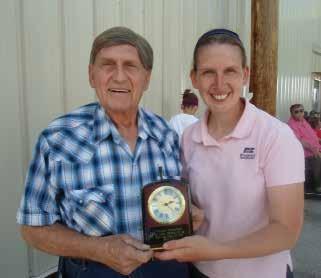
“I was on cloud nine to receive a message from the American Farm Bureau President,” said Trayton.
It doesn’t take long for those who sit down with Trayton to know his passion for Farm Bureau. As he reflects upon his work as the membership chair, that passion stems from one thing: people.
“The people I have seen and met over the years have been the most enjoyable,” said Trayton. “I am grateful to have worked with the Fond du Lac County Farm Bureau board of directors and all of the farmers in my county.”
Despite retiring from the role of membership chair, Trayton said he isn’t quite done yet.
“I have to keep my Farm Bureau Proud Club status, after all!”



With
Lafayette County’s
CHRISTINA BENSON 5Minutes
Tell us a little about yourself.
I am a personal banker/manager at Woodford State Bank in Darlington. I live on an dairy farm where the cows are milked two times a day in a stanchion barn. I enjoy traveling as much as I can and taking photographs of the memories along the way.
What do you enjoy most about your career in agriculture? Why?
I enjoy seeing new animals be born and grow. I also enjoy seeing the seeds you plant flourish into crops to feed those animals.
What is the success in your agriculture career that you are most proud of?
Since agriculture is not my career, it is my home life, I would say watching the perseverance that goes into running a farm. It makes me proud. You have to get up every day even though it can be tough and you just have no energy some days. Just that perseverance to just do it again and again.

tedious work, but it is necessary. Just like a fence is a boundary, I learned personal healthy boundaries are needed in life.
What is a Farm Bureau experience that you are most proud of and why?

What are some of the challenges you face in agriculture and how do you handle them?
Some challenges I witness are giving your heart and soul and you are still subject to what markets are going to pay you. You put in the same work, but don't necessarily get a great price even though you produce the same product. That doesn't stop us from doing it though.
What is one agriculture experience that has defined you and why?
I'd say fencing is an agricultural experience that comes to mind. ‘They’ say good fences make good neighbors. When it came time for neighbors to put cows near a 40-year-old fence, we had to tear it out and I got to learn the art of taking clips off, pounding posts and putting the new clips in. That can be very
An experience that I am proud of is going through the Leadership Institute and reflecting inward on my involvement in agriculture. It might not have the typical ‘green acres’ moments, but I get to share my experience.
What is something that most Farm Bureau members would not know about you? Explain. I used to race a 4-cylinder car at the Lafayette County Speedway. I was helping at a shop one night and a conversation came up if I would run a car that I helped build. I was number 11 because it was easy to make with duct tape.
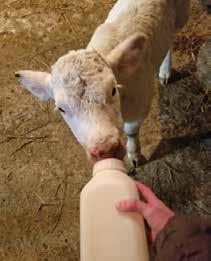
Why are you proud to be a Farm Bureau member?
I am proud to be a member and to share my story in hopes that others can grow in the organization too.
What advice do you have for new Farm Bureau members or those looking to get more involved?
Just attend an event. It helps network with people throughout the county and might lead to more things than you ever imagined.
24 WISCONSIN FARM BUREAU FEDERATION Rural Route
PHOTO SUPPLIED PHOTO SUPPLIED PHOTO
SUPPLIED

Farm Bureau Member Saves with Caterpillar Benefit
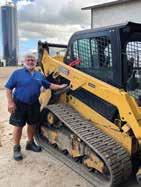
Wisconsin Farm Bureau District 1 Board Director and Kenosha County Farm Bureau member Dave Daniels saves with ease when using his Farm Bureau member benefits.
Dave Daniels is part owner of Mighty Grand Dairy LLC, a multi-family farm in Union Grove, that has 575 cows and raises 500 replacement heifers. To feed the animals they grow 1,150 acres of alfalfa, corn, winter forage and winter wheat. The LLC was formed in 1997 to optimize the three families’ working capital and to have a better work schedule.
Dave understands the importance of optimizing capital to stretch every dollar. One way Dave has done this is by taking advantage of Wisconsin Farm Bureau benefits.
Recently, the farm was in need of a new skid steer loader. That was when Dave made the trip to the Fabick-Sturtevant Cat® dealership. There Dave was introduced to Nick Lovrine who was knowledgeable about the Farm Bureau member benefit
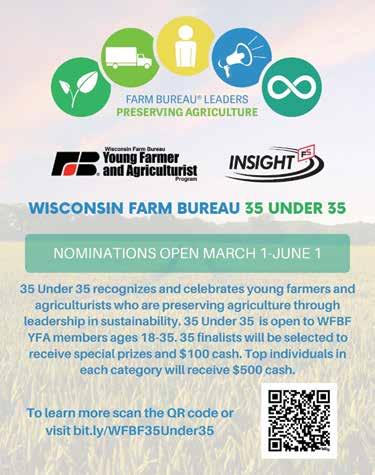
discount that Dave was eligible for.
“It was easy!” said Dave. “The salesperson did the most. All I had to do was mention the Farm Bureau discount and he knew what to do. I’ve used this benefit three times and each time the process was straightforward and smooth.”
WFBF members can save up to $2,750 on Cat excavators, skid steers, wheel loaders and more with your member benefit. You can also receive an additional $250 credit on select work tool attachment purchases with new Cat machines, excluding buckets, forks, thumbs and coupler attachments. These discounts can be combined with any current retail discount, promotion rebates or offers available through Caterpillar or its dealers, with the exception of the CAT NCBA membership incentive.
“It’s an easy way to get a rebate on purchases you are already going to make,” said Dave. “Farm Bureau benefits make it easy to receive partial or even all your money back on your dues by using the member benefits program. If you make use of it, the benefits program pays for your membership.”
To save money with ease by using Wisconsin Farm Bureau Benefits and to view a complete list of eligible Cat equipment discounts, visit wfbf.com/membership/member-benefits.


26 WISCONSIN FARM BUREAU FEDERATION Rural Route
MEMBER BENEFITS





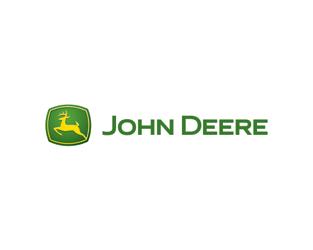


Learn more about your Farm Bureau member benefit savings by scanning the QR code or visiting wfbf.com/membership/member-benefits. Get





*WFBF member benefits may be changed or discontinued at any time without notice.*


Insurance Company Rural Mutual
Member Protector Policy
the MEMBER BENEFITS MOST out of EVERY DOLLAR with your FARM BUREAU
Wisconsin Farm Bureau members qualify for a variety of membership benefits and discounts that serve the needs of farmers, families and businesses in Wisconsin.
New Members and Database Will Help Us Grow
A Message from WFBF's Brad Olson

Wisconsin Farm Bureau wouldn’t be what it is without our most important asset: our members.
As a member you provide policy directives that guide us legislatively, feedback on our programming and events that drive our next version and direction in how we support the next generation of Wisconsin farmers and agriculturists.
Everything we do is guided by you, our members. As the state’s largest general agricultural organization, it takes a lot to keep our more than 48,000 members engaged, informed and involved.
This is why we are more than a little excited about a new system we will be implementing in just a few short months. Our membership database has served its
purpose but has not been efficient for quite some time. This has been a large undertaking. The process of finding a vendor, surveying needs and collecting feedback has taken some time but we are finally seeing the light at the end of the tunnel.
Something as mundane as a membership database might seem like a fairly small change but for WFBF and helping us serve our members, it will be a huge asset. We should be embracing this new system by early June.
You might be wondering why I am sharing this news with you. While a large project for us, your part is fairly small, but very important.
With this new system, or with any system, we can only be as good as our data. So as a member it will be important for you to take the time to verify your information and make sure your profile is complete, including your communication preferences and interests. I promise it won’t be too hard to complete as most of the information we need from our members are the basics: name, phone numbers, address, spouse’s name, etc. The more information you provide, the more it will allow us to serve you to the best of our ability.
I should also note that with all changes there will be some learning curves. This might mean that we have certain time allotments needed for some updates, or tasks might take longer than normal
because we have to work through some questions within the new system. While we might encounter some obstacles, in the long term, our ability to serve you will ultimately get better.
Exciting things lie ahead, and I appreciate you taking the time when asked to provide your part.
I know that many of us are anxious to get into the fields and get the season going. However, I hope you consider Farm Bureau membership before you dive in. This year, the early bird membership deadline is April 30. This means you still have time to lock in some new members.
This is of value to you because it ultimately builds the Farm Bureau family and your network. By bringing in new members and ideas, we will grow even stronger.
Think about your Farm Bureau story and how you can engage and create that story for someone else. You also can’t forget about the county Farm Bureau incentives if you reach your membership goals.
The time and talent you put into Farm Bureau is impressive. Thank you for the effort you give and please know we appreciate your help in making this organization what it is.
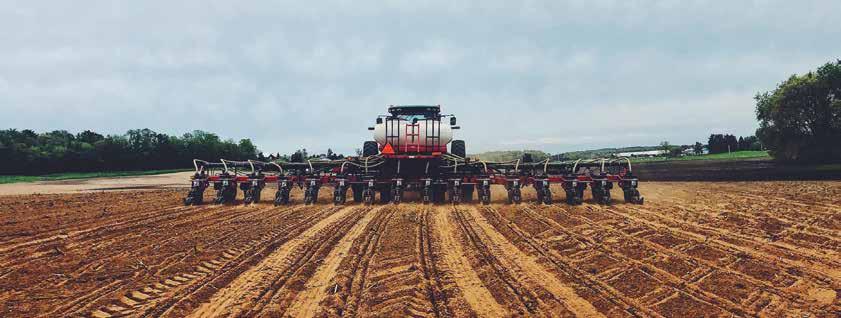
28 WISCONSIN FARM BUREAU FEDERATION Rural Route VOICES
Olson was elected President of Wisconsin Farm Bureau in 2023. He is a crop farmer near Frederic in Polk County.
AI’s Growing Role in Agriculture
A Message from AFBF's Zippy Duvall
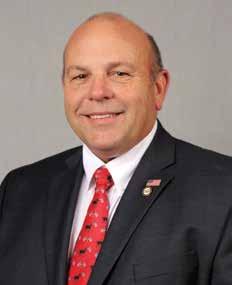
Many times, while standing on the very land my father and grandfather cultivated, I reflect on how things have changed. From the adoption of new sustainability practices to our approach to livestock management, our farming methods have evolved significantly. Gone are the days of relying on a walkie-talkie at our hip and a small notebook and pencil tucked into our front pockets. Don't get me wrong – those tools were powerful in their day. But now we have so much technology at our fingertips and at the wheel of our machinery.
Today, new technologies, innovations and sustainability practices are emerging and reshaping the future of agriculture. Now with the integration of Artificial Intelligence the possibilities seem endless. Farmers get a front row seat to the latest innovations as we have the opportunity to embrace these new frontiers in agriculture.
In February, I had the opportunity to travel to Houston, Texas, for Commodity Classic, to meet with fellow farmers
and step into the future of agriculture. Commodity Classic is renowned for providing unparalleled insight and access to the latest advancements in agriculture. And from the moment I stepped onto that trade show floor, I was surrounded by an atmosphere buzzing with excitement and possibilities. A great example of where new frontiers begin in farming with groundbreaking technologies and research.
From drones and robots to new data intake and analysis programs, there was much about the future to be captivated by, especially when it came to this new central theme of Artificial Intelligence. For example, I saw how farmers are now able to better analyze crop yield and soil health by having easy access to the soil sampling of their county or having that technology to do it themselves; data that used to involve numerous players and take weeks to gather, now being done almost instantly. This was also the case with new AI-powered crop management software. Farmers can now use platforms remotely to monitor crop health in real-time, able to detect early signs of disease, pests and nutrient deficiencies. Lastly, I had the chance to step into the advancement of machinery by seeing how new equipment uses AI algorithms to autonomously navigate numerous tasks on the farm such as planting, weeding and spraying. To be honest, I’m not even sure I can fully explain everything I saw and how it works. It was a mix of excitement and uncertainty of the unknown – but there are plenty of things to learn about as we find ways to continue our efforts to make better decisions for our farms. It was also evident that, across the board, AI is not merely a trend in agriculture but a transformative element shaping the future of American agriculture.
For Farm Bureau, we embrace this new frontier through the lens of our policy, set by our grassroots members at our annual convention in January. I’ll call it a cautious approach. Farmers and ranchers see the potential of AI in enhancing productivity and sustainability on the farm, but we recognize the importance of ensuring that AI technologies are deployed ethically and responsibly, safeguarding the interests of farmers and ranchers.
The new AI policy constitutes a commitment to responsible innovation. We as an organization advocate for clear guidelines for the use of AI in agriculture with a focus on transparency, accountability and fairness. From promoting transparency and safety standards to advocating for equitable access and liability frameworks, we want to chart a course that helps farmers embrace new opportunities while protecting their data and livelihoods.
AI is increasingly being woven into the latest technology and farm equipment, offering farmers unprecedented insight and efficiency. However, as AI’s integration grows, so too does the need for thoughtful policy to govern its use.
The journey ahead in agriculture will be filled with many exciting innovations as we strive to meet the challenges of feeding a rapidly growing population. We embrace this new frontier with appropriate caution, always looking before we leap, to ensure we also maintain the vibrancy of our farms, ranches and rural communities.

29 wfbf.com APRIL | MAY 2024
President of the American Farm Bureau Federation, Duvall raises beef cattle, hay and poultry in Greshamville, Georgia.
Grassroots in Action
Farm Bureau prides itself on being a grassroots organization. Members belong to one of the 61 county Farm Bureaus. Throughout the state, local members advocate for Farm Bureau and agriculture in a variety of ways. Here are some of the activities and projects happening locally.
Wood County Student Sponsorship
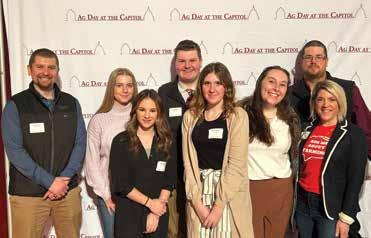
Wood County Farm Bureau sponsored six high school students to attend Ag Day at the Capital. Each student was paired with an experienced Farm Bureau member while visiting with legislators to navigate the ins and outs of advocating on agricultural issues. Students were encouraged to identify an issue/concern that they were passionate about and discuss it with their elected officials. These students left the event feeling empowered and are eagerly awaiting for their opportunity to join their county’s YFA program.
Sheboygan County Snowflake Social

Sustainability Workshop and Reception at Eau Claire Farm Show
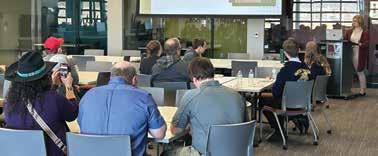
Ten area county Farm Bureaus came together to sponsor a booth at the 60th annual Eau Claire Farm Show March 5-6 as well as a reception and workshop following the Farm Show on March 5. The reception and workshop was held at Chippewa Valley Technical College. "Creating a Culture of Sustainability for Your Business" was presented by WFBF's Director of Sustainability Communications and Partnerships Rachel LaCount (Gerbitz).
District 3 YFA Bowling Night
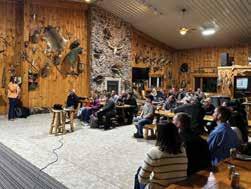
Sheboygan County Farm Bureau hosted a Snowflake Social, an informational and social event, on Feb. 17 at the Bulitz Pumpkin Farm. The event’s featured speaker was owner of Ag Inspirations LLC Kim Bremmer. Kim grew up on a dairy farm in central Wisconsin, is a mother of two, graduate of UW-Madison and was an on-farm dairy nutrition consultant for nearly 15 years. Many members attended and enjoyed hors d’oeuvres and drinks.
WFBF District 3 YFA Committee Representatives Morgan and Casey Lobdell hosted a fun-filled bowling event in Richland County on Feb. 24. The bowling night brought together Farm Bureau members for an evening of friendly competition and camaraderie. The event took place at The Phoenix Center, where participants of all ages and skill levels showcased their bowling talents.

30 WISCONSIN FARM BUREAU FEDERATION Rural Route

Green Lake County Family Game Night

Green Lake County Farm Bureau hosted a family game night on March 9 at the Senior Center in Green Lake. Thirty-five members attended the event that included a potluck, bingo, trivia and a variety of board games.

Rock County Axe Throwing
In February, Rock County Farm Bureau had a fun night of axe throwing at Papa Docs in Janesville. The event was attended by flannelclad members who enjoyed throwing axes and ninja stars while bonding with each other. The night was also an excellent opportunity for team building for county Farm Bureau groups. The event attracted guests from neighboring Green County, and members had a chance to share their excitement for future Farm Bureau events.
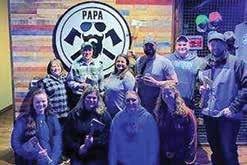
Farm Bureau Town Hall Meeting
County Farm Bureaus in Districts 8 and 9 put together a town hall meeting on Feb. 10 to discuss potential legislation that would impact weight limits for Wisconsin log truck drivers. The meeting allowed for WFBF staff to provide information regarding the legislation and for these individuals to discuss its potential impact on Wisconsin agriculture. Grassroots efforts like this are a testament to the power of Farm Bureau.
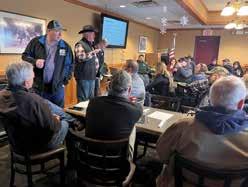
Fond du Lac County Educational Booth at Ag Showcase
Envision Greater Fond du Lac hosted the 18th annual Ag Showcase event on March 2 at Fond du Lac County Fairgrounds. Nearly 1,000 people attended the event. The Fond du Lac County Farm Bureau sponsored an educational booth at the event, where members handed out Farm Bureau membership materials and shared the Agriculture in the Classroom ‘edible soils’ activity with kids who attended the event.
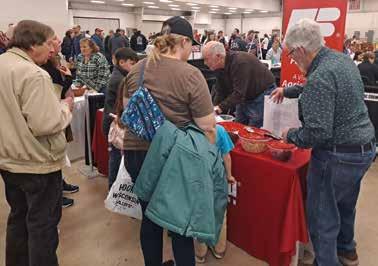
Shawano County Agriculture Career Day
Shawano County Farm Bureau Promotion and Education Committee hosted an Agriculture Career Day. The primary goal was to connect applicants with immediate area openings. The event also provided an opportunity for youth and others to learn more about career pathways within agriculture. Nineteen businesses and more than 80 individuals attended the event to connect with each other. The event was promoted on social media, through advertisements, interviews, posters and word of mouth.
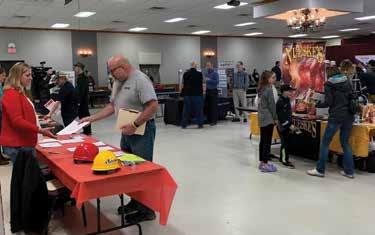
31 wfbf.com APRIL | MAY 2024
With Tammy Wiedenbeck
May IS Beef Month - What You Didn't Know (But
May is when a farmer's attention turns to thoughts of marketing and advocating for their agricultural products. Most farmers talk about how they got into the profession to do just that, farm. Spreading the good word about beef probably wasn't high on the priority list, between long days in the fields and even longer nights struggling with calving season.

Luckily for all the cattle-herding individuals out there, some brilliant minds have your back. Organizations have been formed to handle the advocacy piece, freeing up your time to focus on the very important work of raising beef. In the U.S., farmers contribute $1 per head on cattle sold domestically or imported. The Cattlemen's Beef Promotion and Research Board retains 50 cents for national initiatives, while the remaining 50 cents stays with the respective state beef councils. During May Beef Month, it's time to tip our hats to the groups that formed partnerships to do the heavy lifting on educating consumers.
For example, take the American Farm Bureau Foundation for Agriculture. They created the "On the Farm" STEM curriculum with lesson plans on beef production. That is 60-plus hours of face-to-face engagement and materials for teachers that reach more than 70,000 students about where their beef comes from. Applications for this program were up 700% for 2024.
Then there's the U.S. Meat Export Federation. Their efforts are driving international demand for U.S. beef higher, where market share is up on the value-added chilled beef program (beef that’s never been frozen). Exports to countries like Japan and Korea remain strong as tourism rebounds, revenge spending occurs and the food service industry demands U.S. beef. There’s a growing appetite for beef cuts like tongue, round and intestines in Taiwan, Indonesia and Africa. The value per head on those cuts has increased from $17/head to $52/head, now
Beef promotion resources

Should)
The U.S. Cattlemen's Association has been doing research on feeding cattle an omega-3 enriched diet to up those healthy fats in beef products and increase palatability. These experts also brought us the fascinating "Meat Demand Monitor" to track consumer trends*. You can also hear more about it on the Agriculture of America podcast, designed to keep farmers and ranchers informed on the latest agriculture news.
Of course, we have the National Cattlemen's Beef Association. They cover the bases with research on nutrition, safety, sustainability and more. They continue to improve the Beef Quality Assurance (BQA) program, the 30-year beef tenderness study and deliver informative videos. They’re working to understand beef’s role in the diet and have a seat at the table at 25 nutrition science thought leader events, the Adolescent Nutrition Summit and the Heart Health Journal Club.
Other industry organizations have formed collaborative partnerships as well. The North American Meat Institute has engaged in e-commerce marketing with the retail chain Giant Eagle and the American Culinary Webinar. The Northeast Beef Promotion Initiative has partnered with the International Restaurant and Food Service Show of New York, as well as educational institutions like Seton Hall and UConn. Additionally, the National Institute of American Agriculture will be holding the 14th Annual Antibiotics Symposium this fall.
Which brings us back to our beloved home state. The Wisconsin Beef Council has been working hard on Walmart e-commerce and Build Your Base campaigns, television cooking segments, the Beef Leadership Institute, digital media and even an upcoming Stockmanship and Stewardship event in Lancaster on Aug. 28-29.
Spend some time learning about the greatest food to ever grace a grill not just in May, but everyday.
* Meat Demand Monitor: agmanager.info/livestock-meat/meat-demand/monthly-meat-demand-monitor-survey-data
• beefresearch.org
• youtube.com/@NationalBQA
• cattlecalling.org
• youtube.com/@BeefCheckoff
• beeftips.com
• beefitswhatsfordinner.com
Tammy Wiedenbeck is the District 3 Representative on the WFBF Promotion and Education Committee. Tammy is the seventh generation on her family’s farm and works together with her brother’s family and parents to run the beef and crop operation. She also manages a photography business on the side. The Promotion and Education Committee is a dynamic group of Farm Bureau leaders who develop, implement and promote programs that build agricultural awareness and provide leadership development to the agricultural community.
Promotion and Education Program
WISCONSIN FARM BUREAU FEDERATION
AROUND THE TABLE
Visit gatherwisconsin.com for more recipes.
Recipe from the Wisconsin Potato & Vegetable Growers Association
INGREDIENTS
• 3/4 lb. Yukon Gold potatoes, quartered
• 11/2 lb. boneless beef sirloin steak, cut 1 inch thick
• 2 c. green beans loose-pack frozen, cut
• 1 small onion, sliced
• 11/2 c. salsa, thick and chunky
• 14 oz. lower-sodium beef broth
• 1 tsp. dried basil, crushed
• 2 cloves garlic, minced
Potato and Southwestern Steak Soup Breakfast Tacos
INSTRUCTIONS
1. In a 4-quart slow cooker, combine potatoes, green beans and onion.
2. Trim fat from meat; cut into 1-inch pieces and add to cooker.
3. In medium bowl, stir together salsa, broth, basil and garlic. Pour mixture over meat and vegetable mixture in cooker.
4. Cover, cook on low heat for 8 to 10 hours or high heat 4 to 5 hours. Stir before serving.


Recipe from the Wisconsin Potato & Vegetable Growers Association
INGREDIENTS
TACOS
• 8 flour tortillas
• 2-3 medium russet potatoes, peeled and cubed
• 2 tsp. ground cumin
• 6 oz. Chorizo sausage
• 1/4 c. milk
• 2 Tbsp. butter, divided
• 1/2 tsp. pepper
• 1/2 tsp. salt
• 1 c. sharp cheddar cheese, shredded
YOGURT SAUCE
• 1 c. plain Greek yogurt
• 2 Tbsp. lime juice
• 2 tsp. (or to taste) hot sauce
OPTIONAL TOPPINGS
Green onions, cilantro, salsa, pico de gallo, sliced avocado, sliced pickled jalapenos
INSTRUCTIONS
1. Place the potatoes in a medium pot and cover with one-inch of cold water.
2. Bring to a boil and simmer for 5 minutes or until potatoes are tender. Drain.
3. Add 1 Tbsp of butter to a skillet over medium/ high heat. Add the drained potatoes, sprinkle with the cumin and cook, stirring occasionally, for 5 to 8 minutes, until slightly brown and crispy around the edges.
4. Spoon the cooked potatoes into a bowl and set aside. Crumble and brown the sausage in a skillet. Meanwhile, whisk the eggs, milk, salt and pepper in a bowl until combined.
5. Melt 1 Tbsp. butter in a medium skillet over medium-low heat. Pour in the egg mixture and cook, stirring until scrambled.
6. To assemble, fill each tortilla with about 1/4 c. of eggs, 1/4 c. crispy potatoes, a spoonful of Chorizo sausage and sprinkle with cheddar cheese. Top with a dollop of yogurt sauce and serve.
33 wfbf.com
Growing Leaders in the Heartland at YF&R Conference

Wisconsin Farm Bureau members and staff participated in the 2024 American Farm Bureau Young Farmers & Ranchers Leadership Conference held in Omaha, Nebraska, at the beginning of March. The conference provided learning opportunities for attendees to increase their knowledge and skills in the areas of leadership development, consumer outreach, membership value, and advocacy and education while building networks and connecting with industry leaders and experts. The event brought together nearly 900 agricultural leaders to learn, share and grow together to build a stronger Farm Bureau.
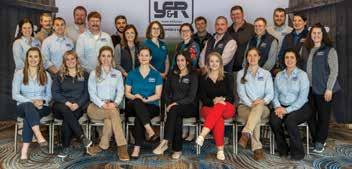
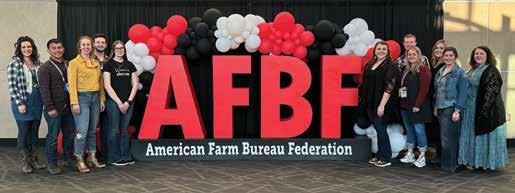

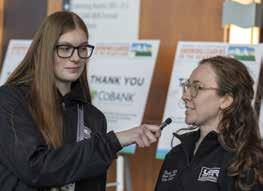
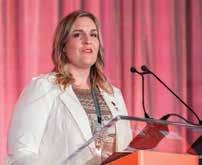
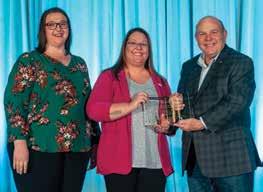

1. Members engaged in breakout sessions, heard from inspirational speakers, explored Nebraska agriculture and tourist destinations, and networked with other Farm Bureau members from across the country.
2. Rachel Harmann graduated from AFBF’s 11th Partners in Leadership Advocacy (PAL) class. This national program is designed to help agricultural leaders accelerate their engagement abilities and solidify their roles as advocates for agriculture.
3. Breanna Cisketti (left), a UW-Platteville Collegiate Farm Bureau member, served as a social media ambassador for the conference.
4. UW-Madison Collegiate Farm Bureau member Ethan Jackowski represented Wisconsin in the Collegiate Farm Bureau Discussion Meet.
34 WISCONSIN FARM BUREAU FEDERATION Rural Route LEADERSHIP
A group of the Wisconsin Farm Bureau members in attendance at the YF&R Conference.
WFBF YFA Committee Chair Kat Peper gave an introduction at the opening general session.
1 3 2 4
Ben and Haily Sand played a large role in planning and coordinating the conference as members of the AFBF Young Farmers & Ranchers Committee. (front row, third from left: Haily Sand; middle row, third from left: Ben Sand.)
Spotlight on
YFA
Get to know the members who are leading Wisconsin Farm Bureau’s Young Farmer and Agriculturist Program.
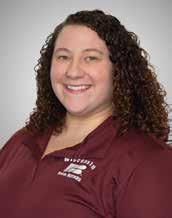
Victoria Smith, District 5 WFBF YFA Committee Representative Farm Bureau member since 2012
Why do you value your Farm Bureau membership?
My Farm Bureau membership is important to me because it has helped me out in different phases of my life. When I was in college, it helped me grow in my knowledge of parliamentary procedure and governmental affairs. After college, it has helped me out financially while traveling. The discounts and benefits that are available to members when traveling are incomparable to anything else. Recently, my Farm Bureau membership has helped me in the leadership portion of my life. As a WFBF YFA Committee member, I can learn and grow in a leadership role that gives me great experience for the future.
What has been your favorite Farm Bureau program/event/ etc. and why?
There is one event that I hold near and dear to my heart and that is our annual Marquette County Dairy Breakfast. This event is a core memory for me. When I was a little kid, my parents were members of the county Farm Bureau board, so we were at the breakfast from set-up to take-down. The event
became something that I looked forward to every year and when we were there with the rest of the members and their families it felt like we were all one big family. To this day, I look forward to the second Sunday in June to help our county Farm Bureau put on a dairy breakfast that brings back the best memories.
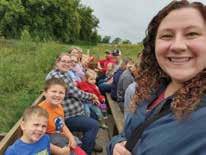
What would you tell YFA members about getting involved in the YFA program?
Go to the events, be active on committees and participate in contests. They may seem scary and intimidating, but as you grow in your experience with Farm Bureau you will find that others were just as scared and intimidated as you in the beginning. Eventually you will be going to events and hanging out with what seems like your second family.
Best words of advice/words of wisdom. Take advantage of the opportunities that are given to you. You will not be disappointed!
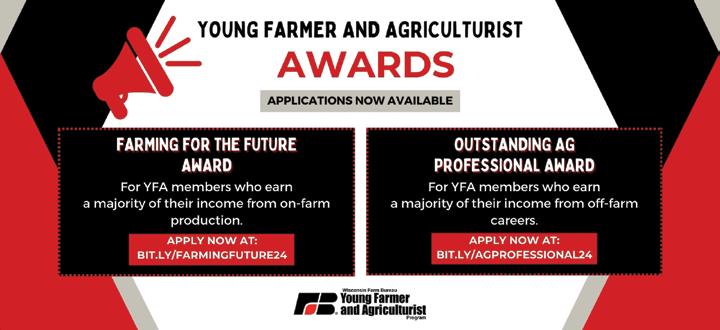
35 wfbf.com APRIL | MAY 2024




36 WISCONSIN FARM BUREAU FEDERATION Rural Route
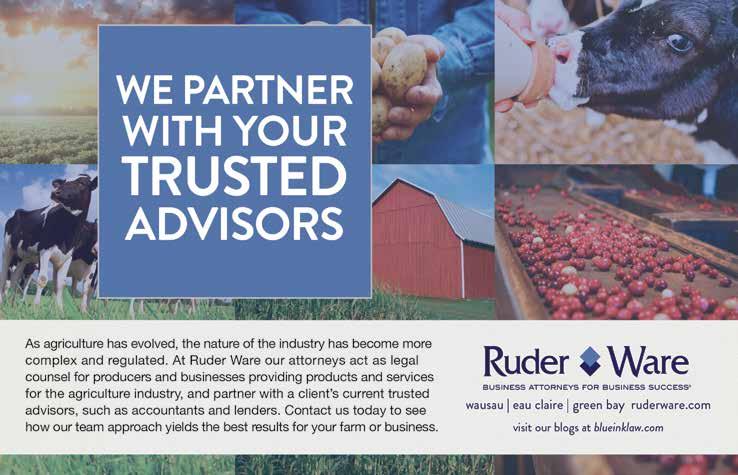


37 wfbf.com APRIL | MAY 2024

Comes to Wisconsin
Farm Rescue, a nonprofit organization that provides free planting, haying, harvesting, commodity hauling and livestock feeding assistance to farm families who have experienced a major illness, injury or natural disaster, has added Wisconsin to its growing list of service states.
Operations will begin with harvest assistance beginning July 1 with planting, haying, commodity hauling and livestock feeding support to follow in 2025 and for years to come. These services will be available to eligible farm families across the Badger State.
This expansion is being made possible through the generosity of several major donors and sponsors, including John Deere, AnheuserBusch through its brand Busch Light and Nutrien Ag Solutions. Farm Rescue has also received equipment support for its Wisconsin operations through John Deere at both the corporate and local dealer levels. The company is helping to coordinate delivery of a combine for 2024 harvest assistance efforts in Wisconsin and the surrounding region, as well as supplying tech support and service for Farm Rescue’s initial launch of operations in the state.
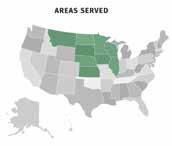
Rescue. “We look forward to extending a helping hand to farm families in crisis within Wisconsin.”
With the addition of Wisconsin in July, Farm Rescue and its volunteer workforce will now serve a total of nine states. The nonprofit is accepting applications for assistance from families within its existing service states, including Illinois, Iowa, Kansas, Nebraska, North Dakota, Minnesota, Montana and South Dakota. Any farm family experiencing a major injury, illness or natural disaster is encouraged to apply at farmrescue.org or by calling 701.252.2017. Referrals are also welcome.
Farm Rescue was founded in 2005 and has helped more than 1,000 families since its inception. The organization’s mission is to help farmers and ranchers who have experienced a major illness, injury or natural disaster by providing the necessary equipment and volunteer labor to perform time-sensitive services.
“Farm Rescue is very thankful for the unwavering support from our family of sponsors in helping us grow our service area,” said Bill Gross, Founder and President of Farm
Heroes of Hope, under the Farm Neighbors Care campaign, is focused on shedding light on rural heroes who have helped others through a tough time – i.e., helping harvest crops while going through a tough time, providing positivity in their day-today careers, uplifting other farmers to get through a tough season, etc. Heroes of Hope aims to identify people who have helped bring hope to farmers or businesses, either in large or small ways. Members of the agriculture community are encouraged to nominate individuals who have made an impact on the way they conduct business, both ordinarily and extraordinarily.
Applications for assistance are being accepted and can be obtained at farmrescue.org or by calling 701.252.2017.

38 WISCONSIN FARM BUREAU FEDERATION Rural Route

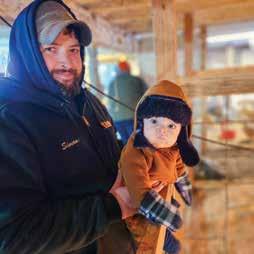
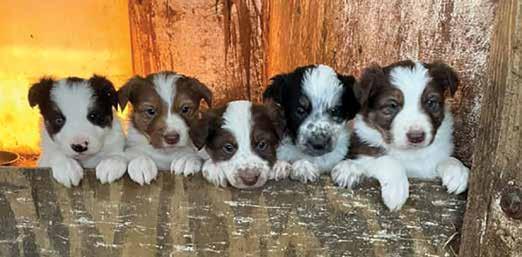
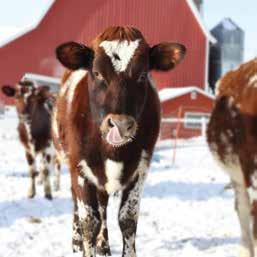
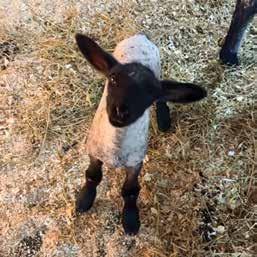
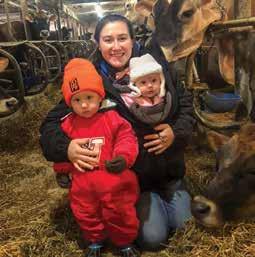

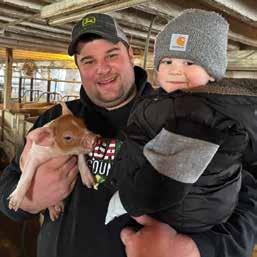
Send us YOUR Photos
Wisconsin Farm Bureau members live and work with beautiful landscapes and livestock. On this page we highlight those sights and special moments.
Please email your best photos (high resolution jpgs at 300 dpi) to Lsiekmann@wfbf.com Due to the high volume of photos we receive, we are unable to publish every photo. Photos sent in may be used in other WFBF publications.
Ashley Lisowe, Malone
Rachel LaCount, Kaukauna
Nicole Laack, Plymouth
Gloria Regan, New Holstein Rachel Pankratz, Auburndale
Brooklyn Schwoerer, Edgar
39 wfbf.com APRIL | MAY 2024
Jessie Kesler-Jansen, Hilbert
Springing Ahead with Agriculture in ALL Classroom Grants
T2024 Book of the Year Announced

Wen agricultural literacy projects have been selected to receive "Ag in ALL Classrooms" agricultural literacy grants. The selected projects aim to integrate agriculture into core curriculum areas to enhance student engagement and promote awareness of agriculture's importance in daily life.
Grant applicants were evaluated based on project plans, budgets and expected student learning outcomes in agricultural literacy projects. They also had to select a national agricultural literacy outcome to show the project's impact on student awareness of agriculture.
The selected proposals include applicants from elementary, middle and high schools, as well as course topics that range from kindergarten to high school consumer sciences, and all courses inbetween.
The following projects have been selected to receive $500 Spring 2024 Ag in ALL Classrooms grants:
• “Little Farm Hands” – Envision Greater Fond du Lac Agri-Business Council
• “School Forest Curriculum Backpacks” – Campbellsport High School
• “Ag in the Park” – The City of Waupun Parks & Recreation
• “Celebrating Our Wisconsin Specialties: STREAMing through Wisconsin” – Stetsonville Elementary School
• “Kindergarten Chick Hatching” – Stetsonville Elementary School
• "Crafting Artisanal Cheeses: An Introduction to the World of Fromage" – Waupaca High School
• “Waldorf Ways in the Chicken Coop” – Prairie Hill Waldorf School
• “Making Beeswax Lip Balm” – Fall River School District
• “Trout in the Classroom” – Merrimac Community School
• “Exploring Maple – Past to Present” – Reedsburg Area School District
The grant program is funded by the Wisconsin Farm Bureau Foundation. Learn more about these projects and how you can support or apply for a grant at wisagclassroom.org.
isconsin Agriculture in the Classroom is excited to share the American Farm Bureau Agriculture Foundation 2024 Book of the Year, “My Grandpa, My Tree and Me” written by Roxanne Troup and illustrated by Kendra Binney.
“My Grandpa, My Tree and Me” is the story of a little girl and her grandfather, a pecan farmer.

One special tree ties this family's bonds together for each new generation on the pecan farm and introduces readers to the process of growing, harvesting and processing pecans.
This book will set the stage for the 2025 Essay Contest theme, drive teacher and volunteer trainings, as well as highlight one of Wisconsin’s most diverse agricultural products – trees!
County Farm Bureaus and Ag in the Classroom committees have been champions of the Book of the Year program, ensuring students have access to books that accurately depict modern agriculture. In the fall of 2023, 51 county Farm Bureaus participated in the bulk order program, delivered more than 850 books and educator guides and more than 8,000 Ag Mags to schools and communities across the state.
WFBF will be offering county Farm Bureaus the opportunity to purchase the Book of the Year and accompanying resources to share with their communities at a special bulk rate. Order forms will be emailed to county coordinators in April and county bulk orders are due June 30. All materials will be distributed by WFBF District Coordinators beginning in early August.
If you are interested in purchasing a personal copy of the book, visit agfoundation.org.

40 WISCONSIN FARM BUREAU FEDERATION Rural Route AG IN THE CLASSROOM
WIAgintheClassroom wiagintheclassroom
Connect on Social
Save the Dates for Summer Learning
Engage in food, fiber and fun this summer with professional development opportunities from Wisconsin Agriculture in the Classroom!
Land Ethic and Agricultural Literacy in the Driftless Region
Thursday, June 20 Independence, Wisconsin area
Educators are invited to tour Wisconsin Leopold Conservation Award® winning farms. Explore classroom connections through the context of agriculture, science and environmental studies. Interact with farmers, learn about land stewardship, network with teachers and gain classroom materials inspired by Aldo Leopold's work.
Learn more and register for summer agricultural literacy experiences and workshops at wisagclassroom.org. Space is limited so register early!
Virtual Agriculture in the Classroom Conference Watch Party
Thursday, July 18 Wisconsin Farm Bureau Office in Madison
Can’t make it to Utah for the National Agriculture in the Classroom Conference? No problem! Join fellow educators and volunteers as we participate in a virtual version of the national conference. Enjoy keynote speaker, preview NEW resources from Agriculture in the Classroom and explore elementary, middle and high school breakout sessions. Leave the tech to us, and enjoy networking, lunch and door prizes!
Seeds of Knowledge – Teacher-Led Agricultural Literacy Workshop
Wednesday, July 31 SAGES School in Fox Lake
Spend a day at the School for Agriculture and Environmental Science in Fox Lake and learn from and with other educators. We will tour Alsum Farms potato processing facility, explore the Waupun School Forest with teacher-tested activities and share best practices in teacher-led breakout sessions.


41 wfbf.com APRIL | MAY 2024

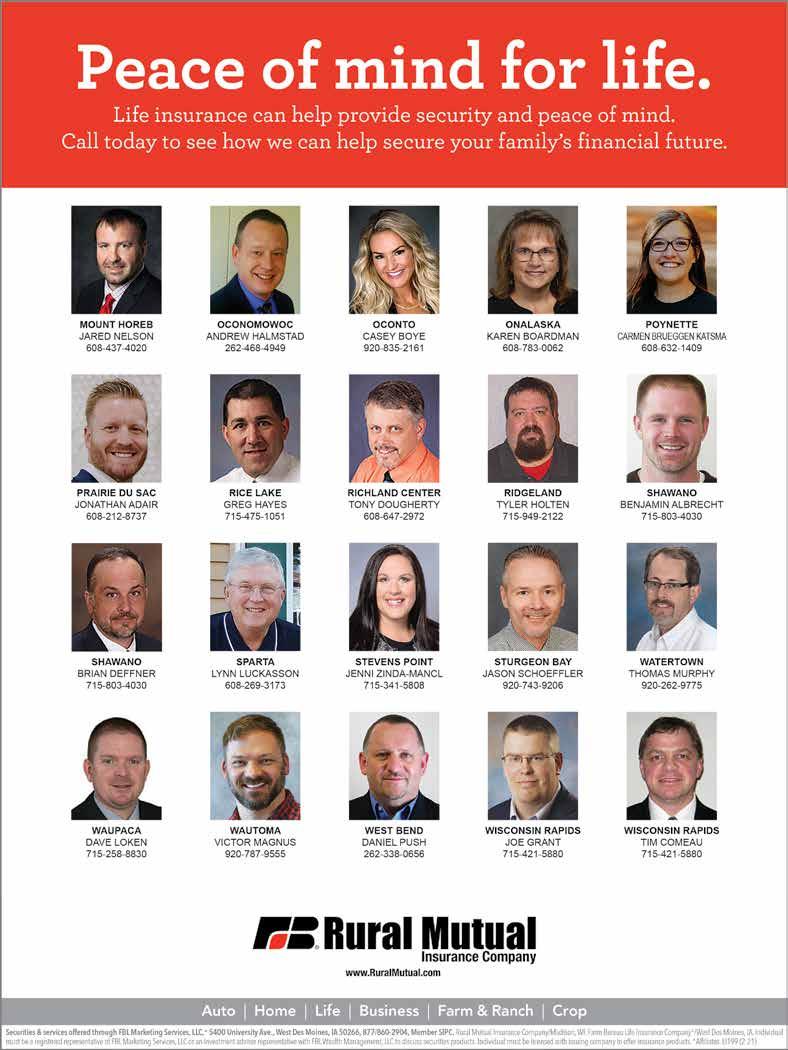
Foundation Establishes Board of Trustees
A newly formed group of Wisconsin Farm Bureau leaders convened for the first time on March 6 as the Wisconsin Farm Bureau Foundation Board of Trustees. The Board of Trustees was established by the WFBF Board and will be responsible for expanding fundraising and program efforts.
The Wisconsin Farm Bureau Foundation was established in 1988 to provide support for agricultural education and leadership programs. Through donations and other contributions, the Wisconsin Farm Bureau Foundation invests time and resources to support the next generation of agriculturists.
The creation of the Board of Trustees was a recommended outcome from a year-long task force, which outlined long-term goals and created a full-time foundation director position.
The Wisconsin Farm Bureau Foundation Board of Trustees includes: Jim Renn, Ben Huber, Robert Nigh, Loren Wolfe, Kaitlyn Kesler, Ken Harter, Sara Menard Huber, Isaac Christenson; at-large representatives Kristi Fiedler, Bob Nash (Chair), Andrew Dal Santo (Vice Chair); and ex-officio members Brad Olson, WFBF President, and Joe Bragger, WFBF Vice President.
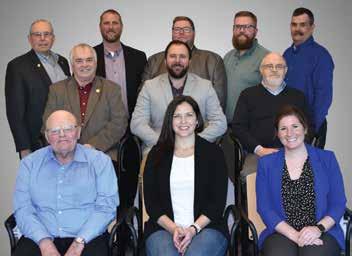
Thank you for your service on the Foundation’s Board of Trustees!
For more information or to make a gift, visit wfbf.com/foundation. As a 501(c)3 organization, donations are tax deductible.

Mark your calendars to join us virtually for the 3rd Annual Giving Day. During this all-day fundraiser, money is given to support education and leadership programs through the Wisconsin Farm Bureau Foundation, including Agriculture in the Classroom, Young Farmer and Agriculturist, Promotion and Education activities and the Leadership Institute.

• Alfred Bosk
• David and Kathleen Mc Clurg in memory of Wayne Harrison
• Taylor County Farm Bureau in memory of Rae Kohn
• Sharon and Kevin Schaefer in memory of John Ausman
• David Kruschke in memory of John Ausman
• Carl Casper in memory of John Ausman
• Ken Congdon in memory of Jim Holte to the Following Wisconsin Farm Bureau Foundation Donors: (Donations were made between Feb. 2 and March 25, 2024)
The Wisconsin Farm Bureau Foundation was established in 1988 to provide support for agricultural education and leadership programs. Through donations and other contributions, the foundation invests time and resources to support the next generation of agriculturists.
Thank You FOUNDATION
About the
Foundation
44 WISCONSIN FARM BUREAU FEDERATION Rural Route
What to Consider When Venturing into Agritourism
Many farms are diversifying their income by adding forms of agritourism, also known as agritainment. This can bring visitors to your farm in various ways, whether it’s educational to learn where food comes from or just for fun to run through a corn maze and pet animals. When you’re checking off your to-do list while preparing your property, don’t forget about your insurance to ensure you’re covered for your new ventures.
What is Agritourism?
Agritourism is an agricultural or aquacultural activity that is primarily operated on the insured’s location for the purpose of tourism or entertainment for monetary compensation. Some examples are:
• Corn maze
• Hayrides
• Farm tours
• Petting farm
• Event venue rental
Discuss Farm Safety
• Pick your own fruit or vegetables
• Pick your own pumpkin patch
These agritourism activities mean children are visiting farms more often. Visiting an agritourism attraction can be very exciting and educational for children. The children come to learn and have fun but are often not aware of the dangers present. Children are naturally curious and perceive the farm as a playground. Therefore, it is important to talk to children about safety when they are visiting.
Many of the visitors may have little or no experience with agriculture and the rural environment so it is vital that adults and children understand the hazards in this type of environment. Regardless of the reasons for children being on the farm, it is the responsibility of the farm owner to control hazards that may risk the health and safety of children and other guests.
Is Farm Insurance Enough to Cover Visitors to My Farm?
Agritourism is not included in Rural Mutual’s farm base policy. If visitors pay you for business activities, the base farm policy insurance isn’t enough. You need special coverage to make sure you’re covered properly. That’s where our agritainment endorsement comes in to provide that extra layer of protection. Depending on the type of activities on the farm, you may want to consider adding a commercial policy in conjunction to make sure all your exposures are covered. Talk with your insurance agent to see what the best coverage is for your farm.
Wisconsin Limited Liability Law Signage
Wisconsin Act 269 provides immunity from liability for agricultural tourism. Farmers are required by law to post the limited law language at every entrance/exit of the farm. This is necessary for an agricultural tourism provider that allows
visitors to tour, explore, observe, learn about, participate in or be entertained by an aspect of agricultural production, harvesting or husbandry. For more information on the Wisconsin Limited Liability Law Signage, visit wiagtourism.com/Resources.
Why is Event Insurance Necessary if I already have Insurance?
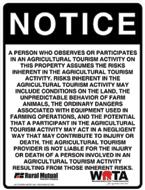
Always plan for the unexpected. During an event, there could be a situation on your property or with an animal that doesn’t have anything to do with the event. It’s important to make sure you’re covered in case something happens out of your control.
If it’s a regular occurrence that you’re booking events multiple times a month or weekly throughout the year, it’s recommended you should provide the coverage yourself by a commercial policy or an agritainment endorsement on your farm policy. If events are not frequent, perhaps a few times a year, an event day policy can come in handy.
You can buy event coverage policies specific for an event, such as a wedding, including liquor liability coverage. If you’re running a business, look at a commercial policy so your guests don’t have to get their own coverage. However, if they do provide their own, ask for a copy of their event policy so you can review the coverages and make sure the policy is adequate protection rather than taking their word.
Talk with your agent to evaluate each unique exposure individually, ways to mitigate exposures and make sure the proper policy is in place if something happens. Guests on your property don’t know the property like you do. Make sure you cover all your bases to keep visitors safe and no exposures left unknown.
What Makes Rural Mutual Different?
When working with perspective new clients, our underwriters, loss control, agents and insureds will walk the farm property together and talk about the operation if it fits the standard farm policy or has a need for an agritainment endorsement.
Many operations begin as a farm and start adding on agritainment revenue streams and don’t realize they’re crossing the line transitioning from agricultural to commercial. Make sure you stay in contact with your agent as your business evolves to have them out to your farm for a tour, take pictures or show them around what you plan to do.
Having staff and agents across Wisconsin, local to your area, makes us unique and offers you individualized protection. We don’t want you to have surprises, and neither do you. Reach out to a Rural Mutual agent to make sure your farm is properly protected.
45 wfbf.com FEBRUARY | MARCH 2024 RURAL MUTUAL
Rural Mutual Recognizes Top Agents from 2023
In early February, Rural Mutual Insurance recognized their 2023 top-producing agents at their annual Honors and Awards Banquet.
Jenni Zinda-Mancl (Stevens Point, Lake & Woods District) was named Rural Mutual’s Agent of the Year.
Keith Wanta (Antigo, Lake & Woods District) was named Financed Agent of the Year.
The District of the Year honor went to the Capitol District,

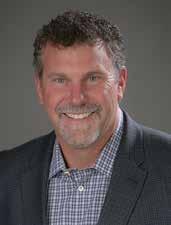
managed by Kurt Johnson
Jenni Zinda-Mancl was recognized as the Company Top Performer in Personal Lines and Commercial Lines.
Keith Wanta was recognized as the Company Top Performer in Farm Lines.
Mathew Immel (Fond du Lac, Big Lakes District) was the Company Top Performer in Life Lines.
Congratulations to all the agents on a record-setting year!

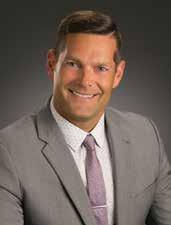
Farm Dividend Declared for Eighth Year
The Rural Mutual Insurance Company Board of Directors declared a 5% dividend on all eligible farm policies for 2023 farm policyholders. This is the eighth year in a row that a Farm Dividend has been declared.
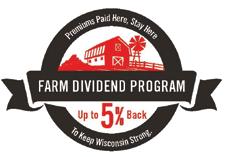
In 2024, an estimated $3.3 million will be paid out upon farm policy renewals. Farmers started to receive dividend checks in late February and early March. Over the past eight years, Rural Mutual has paid out $23.6 million to their farm policyholders in Wisconsin.
“This is the program’s most substantial payout yet,” said Executive Vice President and CEO of Rural Mutual Insurance Dan Merk. “I take great pride that our company’s financial success allows us to reinvest in Wisconsin farms. As an organization rooted in agriculture, the Farm Dividend is a way for us to show our appreciation for the lifeblood of our state.”
In 2017, Rural Mutual Insurance became the first Wisconsinbased insurance company to offer farm policyholders a dividend. The Farm Dividend is one of the ways Rural Mutual continues
to support their farm policyholders. It also reinforces Rural Mutual’s strong relationship with the Wisconsin Farm Bureau Federation.
Rural Mutual is the number one writer of farm insurance in Wisconsin. The company was founded by farmers to better understand their unique insurance needs, no matter the size of the farm. Rural Mutual is a single-state insurer, so local agents’ knowledge is specific to Wisconsin. Its farm coverage options include home and personal items, farm buildings, vehicles, farm personal property and workers’ compensation for farm employees.
For more information on how you may qualify, please reach out to a Rural Mutual agent.
46 WISCONSIN FARM BUREAU FEDERATION Rural Route RURAL MUTUAL
Connect with Rural Mutual Insurance @RuralMutual @RuralMutual @Rural.Mutual @Rural Mutual Insurance Company www.RuralMutual.com
Zinda-Mancl Johnson Wanta Immel

























































 Information and imagery submitted by UW Madison Division of Extension Ag Water Quality Program and Discovery Farms
Scan for more on soil loss and cover crops.
Information and imagery submitted by UW Madison Division of Extension Ag Water Quality Program and Discovery Farms
Scan for more on soil loss and cover crops.

























































































































